#archetype magazine
Explore tagged Tumblr posts
Photo

Grace Bol by Greg Swales for Archetype Magazine 2014
98 notes
·
View notes
Text
The Infinites — Archetypes (Meritorio)

A month or so ago, we caught up with Jared Leibowich’s solo record, Secret Spells, an impressive piece of home-recorded anthemry of which I wrote, “Jared Leibowich’s songs sound much larger than bedroom pop, with their massed vocals and clanging, chiming guitars. [His] expansive, ebullient solo album merit[s] comparisons to the Papercuts, White Fence and Peel Dream Magazine.”
“But have you heard the Infinites?” came one or two responses, a nice change from the dead silence that typically follows a record review. And no, not then, but soon after, this second album from Leibowich’s collaborative project with Dan Levine arrived, and indeed it was very good.
This is a storytelling project, not a confessional one. The debut album featured 13 brief fictional narratives, each about a separate character, over the dreamy clarity of Levine’s guitar loops. Album two is similarly outward facing, this time taking as inspiration 12 archetypes, that is typical examples of a genre of person, a queen, a bureaucrat, a secret agent, a ghost, etc. And yet while this might seem like an approach that would lead to generalities, in fact, each song is specific and engrossing. “The Bureaucrat,” for instance, filling out paperwork is not too busy to long for romance. “The Night Cleaner” toils alone and self-sufficient, after everyone else is gone.
All this unfolds over shimmering layers of guitar and other rock instruments, a trebly romantic onrush that recalls, again, The Papercuts, Wiretree and, in certain lights, post-new wave bands like Tears for Fears. The Infinites have expanded since the debut to include a full band line-up of Ian Rundle on guitar with Levine, Miles Kelley on bass and Sam Jordan on drums. The sound is full and urgent, but also soft enough to encourage dreamy staring out of windows.
“The Ghost” is, perhaps, the best of these tunes, an agglomeration of limpid, yearning guitars, wistful melody and a churning, propulsive bass. If Leibowich’s solo album filled out the contours of bedroom pop into something large and stirring, this work with the Infinites does a nice job of balancing wispy threads of vulnerability with the muscular energy of rock. Listen to how Leibowich’s near falsetto flutters fragilely, at the end of verses, while the band powers in behind him. Delicate beauty and resounding rock crescendo live in uneasy accord. The same thing happens in the following “My Best Friend,” where a plaintive “It’s time to fall again” drifts off into contemplation as the full weight of guitar sound pushes towards resolution.
Archetypes views romantic longing through a variety of lenses. Its characters have different jobs and circumstances but all wish, in their own ways, for love and connection. The music supports this narrative with luminous romantic pop made of glistening guitar tones and pulsing tendons of bass and drums. It’s an embodiment of a certain kind of indie guitar rock, an archetype if you will, and a good one.
Jennifer Kelly
#the infinites#archetypes#meritorio#jennifer kelly#albumreview#dusted magazine#jared leibowich#romantic pop
2 notes
·
View notes
Text
Taurus Through The Houses: What Things Do You Collect? 💎🎨🛍️

The 2nd house & the archetype of Taurus represents possessions and resources we own. It is the metaphorical storage closet / pantry where we put away and organize our possessions. The house you have Taurus shows the material goods you collect based on the themes of that house.

Taurus 1H: you collect things that make you look or smell good: clothes, perfume, hair products. Having a lot of clothes, makeup, that are limited edition or rare.
Taurus 2H: collecting money, assets, valuable things like art, rare clothing items, rare makeup. When a brand has a limited edition items, you buy them. Likely to have different savings accounts/emergency funds etc. Collecting different forms of currency, having cash, digital currency etc.
Taurus 3H: you collect pieces of media: photographs, magazines, cards, posters, vinyls, etc. This placement reminds me of someone who still has their iPod touch or wire headphones. You collect journals, things you’ve written. You have a lot of pictures in your phone, you have receipts of everything, having screenshots, screen recordings. Collecting stationary. Collecting information. Digital information. Leaving all your old posts up and never deleting them.
Taurus 4H: you collect things that remind you of childhood: books, clothing, posters. You hold on to your items for a long time before letting them go. Collecting home goods: cutlery, dishes, bedding. Having alot of plushies.
Taurus 5H: you collect art, designer items. You collect items that will be valuable in the future. Fond of collecting money and wealth in general. This is someone who enjoys achieving financial milestones: increasing credit score, opening retirement accounts, having investments. Keeping a lot of things from your childhood. If you have kids, you collect their belongings like their first blanket, toys, shoes etc.
Taurus 6H: collecting things that relate to health and healing: tincture’s, oils, rare health foods. If you have pets you collect a lot of things for them: toys, treats, clothes etc. Can collect pets in general.

Taurus 7H: collect stuff you get through relationships. Gifts, money, jewelry, precious items you received. Once you get married, you start collecting things or have the money & space to do so. You collect things on behalf of your partner or you share a collection together.
Taurus 8H: collecting things that were once owned by something else: art, jewelry, clothes. Like how Kim K bought Marilyn Monroe’s dress (Kim is Libra Sun, Taurus is the 8th sign from Libra). You collect things that are taboo or occult, rare occult books or items: crystals, pendulums etc. collecting rare designer items that are vintage. You tend to collect a lot of things and keep them for a long time. Collecting secrets about other people, collecting blackmail.
Taurus 9H: collecting books, magazines, journals. Someone to collect academic titles and degrees. Collecting knowledge and information: through reading, watching documentaries, conversations etc. Prefers “collecting experiences”. Collects things from other countries like souvenirs, flags, spices, perfumes, clothing etc.
Taurus 10H: collecting achievements, accolades, awards. Achieving things then having the physical symbol of it: like the shoes you wore in the first track meet you won, saving medals, trophies, putting them on display.
Taurus 11H: collecting memories from your achievements. Like having your first trophies you won, your cap and gown from graduation. Scrapbooking different memories. Collecting vision boards, Pinterest boards etc. Collecting friends, social connections, followers online.
Taurus 12H: collecting things that are old, ancient or antique. Collecting secrets from other people, collecting their secrets or having blackmail on them. Collecting spiritual tools like tarot cards, crystals, pendulums etc. Collecting spiritual or religious iconography like figurines, posters, statues of different deities.

Divider credit: @uzma-qureshi
#astrology#astro observations#astrology observations#vedic astrology#taurus#2nd house#starsandsuch#2024
1K notes
·
View notes
Link
1.
Aurélia Steiner, quella che abita a Brussel,
non è quella donna estremamente colta di Namur o Oostende,
quando va al mare, che ha ancora due passioni:
se faire mousser le créateur provando uno skinny jeans
e poi con lo stesso fare la musardine
fino a ritornare dall’esilio della notte,
dall’inverso del mondo
Aurélia Steengroot
elle traverse Brussel,
e quando c’è il poeta saraceno
girano attorno all’Albertine
che è la Biblioteca Reale
senza accedervi mai
per via del permesso
fin tanto che, stanchi,
se ne vanno al Park van Brussel
di metri 450x320 ed ettari 13
di superficie, è l’antico terreno di caccia
dei duchi di Brabante,
tagliato da grandi viali
che formano prospettive
ampliate dal passo di Aurélia Steengroot
toujours cette magreur de la jeunesse,
il suo modo di camminare dentro
a quei jeans a fior di culo,
il suo kon fiammingo,
che in quanti vorrebbero avere
il permesso reale di toccarglielo
con calma, da assorbire prima
di intraprendere la marcia
attraverso la città
#v.s.gaudio#aurélia steiner#aurélia steengroot#brussel#uh magazine#fiammingo#fitting room#kon van brussel#kut-.archetype#tergolateral#vreugde#oggetti d'amore
1 note
·
View note
Text
Welcome to the wonderful world of Arsène Lupin Copyright Shenanigans
Have I ever told y’all about the absolute madness that is the legal issues around the Lupin franchise ? Probably. Can I find the post in question ? No. Am I going to tell you again ? You fucking bet !
The year is 1905, and detective stories are all the rage. Maurice Leblanc, a young writer, is commissioned by the magazine Je Sais Tout to write a short story on the same model as Sherlock Holmes. Maurice Leblanc says « Screw this detective shit », and creates the character of Arsène Lopin, gentleman thief.
No, this is not a typo.
Arsène Lopin, a municipal advisor in Paris, hears about it and contacts Leblanc. « You are not fucking writing a story about a thief who shares my name. » To which Leblanc replied, « Lopin ? No no, you misunderstand, this is Arsène Lupin, completely different person. »
And he gets away with it.
Leblanc writes a bunch more stories about Arsène Lupin, they get popular, and he decides he wants to write a crossover with the famous British detective, Sherlock Holmes. A crossover in which, of course, Lupin will win and Holmes will be humiliated.
Arthur Conan Doyle hears about it, and is not thrilled. He contacts Maurice Leblanc with a message along the lines of « You are not fucking writing a story where my Amazing-Original-Character-Do-Not-Steal gets bested by a thief. » To which Leblanc replies, « Sherlock Holmes? No no, you misunderstand, this is Herlock Sholmes, completely different person. »
And he gets away with it.
The years pass, more Lupin stories are written, they’re translated and exported outside of France, and wouldn’t you know it, Japan takes a strong liking to the « gentleman thief » archetype in general and to Arsène Lupin in particular.
The years is 1967, and mangaka Kazuhiko Kato, best known by his pen name Monkey Punch, is commissioned by the magazine Weekly Manga Action to create a manga for their first issue. He reads 15 of Leblanc’s stories, and creates Lupin the Third, a character who is the grandson of the famous gentleman thief. He does not bother asking the Leblanc Estate for permission, as Japan doesn’t give much of a crap about French copyright laws.
(For the record, Weekly Manga Action was the first manga magazine for an adult audience (outside of erotica), and Lupin III was published in its first issue, effectively making it one if not the very first adult manga in the history of manga.)
The Lupin III manga gets popular, is adapted into an anime, the anime gets popular, it gets translated into other languages and exported to Europe…
And then the Leblanc estate rears its head. «You are not making an anime about our character without paying us fucking royalties, » they say to Monkey Punch. To which Monkey Punch, channeling the spirit of the deceased Maurice Leblanc into his very soul, replies : « Lupin ? No no, you misunderstand, this is Rupan, completely different person. »
And he fucking gets away with it.
(Arsène Lupin became public domain in France in 2012. Before that, Lupin the Third took many different names in European releases, among which Rupan, Wolf, and in France, Edgar de la Cambriole (Edgar of Burglary).)
Additional tomfuckery :
The year is 1982, and science-fiction animated series are getting extremely popular. TMS decides to try and get a slice of the cake, and begins the development of Lupin VIII, a sci-fi spinoff about Lupin III’s descendant. The anime is being produced in France, and the Leblanc Estate once again rears its head. « Sure, you can make that anime, » they say, « but pay us fucking royalties. » TMS, as previously established, does not want to pay the Leblanc Estate diddly squat, and so they scrap half of the project, recycle the other half, and go « Lupin VIII ? No no, you misunderstand, this is Inspector Gadget, completely different person. »
The year is 1930, and famous Japanese writer Tarō Hirai writes The Golden Mask, a novel in which his detective character Kogoro Akechi goes up against none other than Arsène Lupin. Hirai’s pen name was Edgar Allan Poe- wait, wait, no, sorry, it’s Edogawa Ranpo, completely different person.
(Later, Gosho Aoyama names his character, Detective Conan Edogawa, after Arthur Conan Doyle and Edogawa Rampo (and the anime is distributed by TMS).)
(More than fifty years later, the Lupin III anime makes a tribute to Ranpo’s Gold Mask with the double episode The Imperial City Dreams of Thieves.)
The year is 2021, and Capcom is releasing the video game The Great Ace Attorney Chronicles, in which famous detective Sherlock Holmes plays a central role. Unfortunately for them, a few Sherlock Holmes stories are still under copyright, and the Conan Doyle Estate is about as stubborn and greedy as their French cousins. « Pay us fucking royalties, » they say.
In the English release of the game, Sherlock Holmes is renamed to, you guessed it...
...fucking Herlock Sholmes.
#elliott's nerd corner#the hobbit rambles#lupin iii#lupin the third#arsène lupin#maurice leblanc#sherlock holmes#arthur conan doyle
766 notes
·
View notes
Text
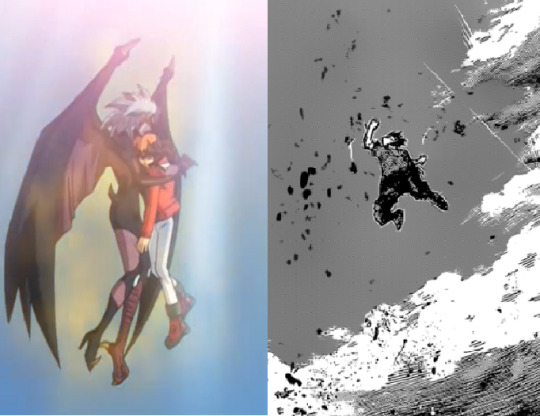
SHIGARAKI VS. YUBEL: HOW TO SAVE YOUR VILLAIN
The failure of Deku to save Shigaraki isn’t just a tragic conclusion for Shigaraki’s arc, it’s also My Hero Academia failing as a story. When I say the story failed, I mean the story has failed to answer any of the questions it asked its audience. It’s themes, character arcs, everything that communicates the meaning of the story to the audience is no longer clear.
Saving Shigaraki was the central goal of not only the story itself, but the main character Deku. By failing in its goal you can’t call this a good ending. In order to illustrate why this goal of saving the villain is so important to both Deku’s character and the central idea of MHA, I’m going to provide a positive example in Yu-Gi-Oh GX were the main character Judai successfully saves their villain. One of these stories fails, and the other succeeds. I will illustrate why under the cut.
BROKEN THEMES = BROKEN STORY
When artists draw they have to consider things like perspective, anatomy, shading, light, coloring. Drawing has rules, and it’s hard to produce good art without knowing these rules beforehand. If I draw something that has bad anatomy, you can criticize me for that.
Writing has rules, just like drawing. The rules of storytelling are important because writing is an act of communication. You can write whatever you want, just like how you can draw whatever you want, but if you break the rules the audience won’t understand what you are trying to communicate.
When I refer to MHA as a broken story, I am referring to the fact that it has broken the rules of storytelling. As this youtuber explains.
“I guess we should first define what broke and broken even means in this context. Has the story turned into an unintelligible mess? Not really. Value judgements aside, the narrative is still functional and fulfills the criteria of being a story. So how can a story that still functions be broken? Maybe to you it cannot. But to me a story that is still functional isn’t enough. What I mean when I say MHA is broken is that it’s lost something crucial. A codifying style of structure, pacing and payoff that until a certain point was the core of its identity.”
I could launch into a long-winded explanation of what themes are, but for the sake of simplicity I like to define themes in terms of “Ask, and answer.” The author asks a question to the audience, and then by the end of the story provides an answer. The audience is also invited to come up with their own answer which prompts them to think about the story on a deeper level. The question both MHA and GX are asking both its main characters and the audience is “Can you save the villain?” with the additional complicated question of “Should you save the villain?” This post will detail how both stories go about answering those two questions, and more importantly why those answers matter for the story.
With Great Power… You know the rest.
My Hero Academia and Yu-Gi-Oh Gx are actually similar stories once you get past their superficial differences. MHA is a story with way better worldbuilding, compared to a society where everything revolves around the trading card game, and people go to school to be better at a trading card game.
However, if you get past that. They are both bildungsroman, stories about the main characters growing up into adults. They both have an academy setting where the goal is for the main character to graduate and enter the adult world. They are both shonen manga. GX is the sequel of Yu-Gi-Oh a manga that ran in Shonen Jump the exact same magazine as MHA. The biggest point of comparison is their main characters, who both start out as young and naive who are driven by their admiration of heroes. Deku is a fan of All Might who wants to become a hero despite not having a quirk, because he loves All might who saves everyone with a smile. Judai’s entire deck archetype revolves around “Elemental Heroes’ and later “Neo-Spacians” who are all based on popular sentai heroes like ultraman.
The central arc for both characters is to grow up. Growing up for both of them not only requires figuring out what kind of adult they want to be, but also what kind of hero they want to be.
Now I’m going to drastically oversimplify what a character arc is.
A character arc first starts out with the character being wrong. Being wrong is essential because if the character is right from the beginning, then there’s no point in telling the story. A character often holds the wrong idea about the world, or has some sort of flaw that hinders their growth. The narrative then needs to challenge them on that flaw. It usually sets up some kind of goal or win condition. That flaw gets in the way of a character “winning” or achieving their goal, so they need to fix that flaw first. If their ideals are wrong, then they need to think about what the right ideals are. If they’re too childish, they need to grow up. If they have unhealthy behaviors or coping mechanisms, they need to unlearn it and require better ones. Otherwise, that flaw will keep sabotaging them until the end.
I’m borrowing the word “win condition” from class1akids here because it’s an incredibly appropriate terminology. Midoriya needs to do “x” in order to win, otherwise this victory doesn’t feel earned. The “x” in this case is usually character development. As I said before, a story where the main character hasn’t changed from beginning to end feels pointless. Especially in Deku’s case, he was already a brave, strong hero who would charge right into battle and defeat the bad guys in chapter one, so him defeating Shigaraki in a fist fight doesn’t represent a change.
The story sets up not only “What does the hero need to do to win?” but also “How does the hero need to change in order to win?” A character either meets these requirements before the end of the story, or they don’t and usually this results in a negative ending.
MHA in its first half quite clearly set up both the final conflict of saving the villains, and also that saving the villains is its “win conditions.” The hero shouldn't be allowed to win without first fixing this flaw.
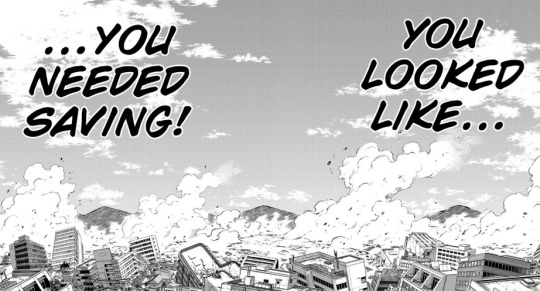
From this panel onward the central question Deku is forced to answer shifts from “Am I strong enough to defeat ShigarakI” to “Can I save Shigaraki?” However, much earlier than that All Might goes on to basically set up the win conditions of what makes the ultimate hero as someone who “Saves by winning, and wins by saving.”
All might: You can become the ultimate heroes. Ones who save by winning, and win by saving.
Therefore the story has set it’s criteria for what kind of hero Deku needs to become. If he wins without saving, then he’s failed to become what the series has set up as the Ultimate Hero.
Shigaraki and Yubel aren’t just narrative obstacles, or boss monsters to be killed like in a video game. They are narrative challenges, which means that the character can’t grow in any way if they don’t answer the challenge presented by the characters. They are villains who actively resist being saved, to provide a challenge for two heroes who define their heroism by saving others. The challenge they pose adds a third question to the story and the main characters.
"Can I save the villain?"
"Should I save the villain?"
"If I don't save the villain, then can I really call myself a hero?"
In other words the decision they make in saving, or not saving their final antagonist defines what kind of hero they are. In Deku’s case it’s even more critical he defines what hero he wants to be because the MHA is also a generational story, and several of the kids are asked to prove how exactly this generation of heroes is going to surpass the last one. The kids growing physically stronger than the last generation isn’t a satisfactory answer, Deku getting strong enough to punch Shigaraki hard is not a satisfactory answer, because we are reading a story and not watching a boxing match.
I’m going to focus on the last two questions though for a moment. Many people who argue against saving villains like Shigaraki argue he is a mass murderer and therefore isn’t worthy of salvation. However, the act of saving Shigaraki isn’t a reflection of Shigaraki himself, but rather the kind of hero Deku wants to be. It all boils down to Spiderman. In the opening issue of Spiderman, teenage Peter Parker is bitten by a radioactive spider and suddenly gains super strength, the ability to stick to walls along with other powers. However, being a teenager he uses these powers selfishly at first. He doesn’t feel the obligation to use his powers for other people, and therefore when he sees a robbery happening right in front of him he lets the robber go. However, because he lets the robber go, the robber then attempts to hijack a car and kills his Uncle Ben in the process. If Spiderman had stopped the robber then he might have prevented that from happening. He had the power to stop the robber, but he didn’t feel responsible or obligated to save other people. As a result Uncle Ben dies. It’s not enough to have power, ti’s how you use that power that reflects who you are, therefore: “with great power comes great responsibility.”
The choice to save Shigaraki actually has little to do with whether or not Shigaraki is redeemable, but rather how Deku chooses to use his power, and what he thinks he is responsible for reflects who Deku is as a person. Deku himself also clearly outlines how he wants to use his power, that One for All is a power for saving, and not killing.
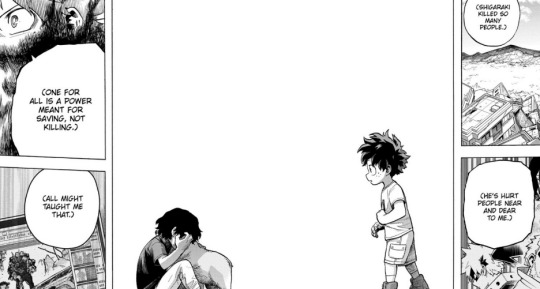
How he uses his power reflects Deku’s ideal in saving others, and therefore if he doesnt use his power to save, then he’s failed to live up to his ideals. It's not whether it's morally right to save a murderer like Shigaraki, but rather the way Deku wants to choose to use his power. It's about whether he feels the responsibility to save others.
Judai explores an incredibly similar arc to Deku. They are basically both asked what kind of responsibilities a hero is supposed to have, which is also a metaphor for growing up to handle the responsibilities of adulthood. As both characters start out with incredibly naive and childish ideas about what a hero is. Therefore realizing what a hero is responsible for is key to them growing as a character. However, Judai is different from Deku. In some ways he’s more like Bakugo. Judai is a prodigy who’s naturally good at dueling. He doesn’t duel to save others, but rather because duels are fun and he’s good at it. He’s very much like Bakugo, who admired All Might as a hero just as much as Deku did, but admired the fact that he was strong and always won rather than he saved others.
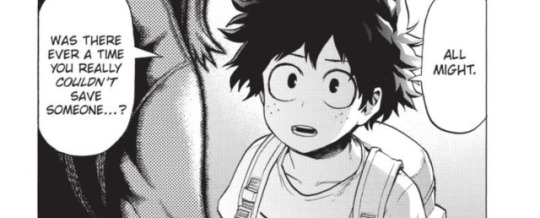
However, I would say both Deku and Judai are questioning what a hero is responsible for. They are both asking if they have the responsibility to use their power to save others. If they have to fight for other people, just because they have power. His first big challenge as a character comes from Edo Phoenix, who calls out Judai for not thinking through what it means to be a hero, and what responsibilities heroes carry. Judai duels because he thinks it’s fun. He will show up to duel to help his friends, but that’s because he’s the most powerful person in the group. Even then it’s because he finds fighting strong opponents to be enjoyable. Bakugo will beat up a villain, but for him it’s more about winning then if the action will save someone or not.
Judai is more often than not pushed into the role of being a hero, he doesn’t play the hero because he’s a particularly selfless person, and he’ll often avoid responsibility if not forced. He has power but no sense of responsibility and the narrative calls them out as a problem.
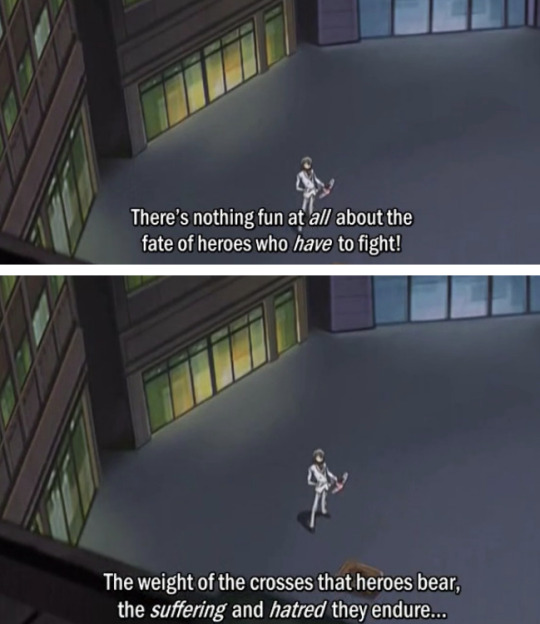
Edo: Can you even fathom that, Judai?
For Judai, he can’t understand the responsibility of being a hero. For Deku, he idealizes heroes so much he can’t understand that there are people out there the heroes have failed to save. These two callouts towards Deku and Judai are discussing similar because they’re both discussing where a hero’s responsibilities lie. Is a hero responsible for saving everyone? Is someone strong like Judai responsible for using their strength to help other people?
Judai’s arc continues into the third season where he’s not shown to just be naive but ignorant. He’s not just childish, he actively resists growing up because he doesn’t want to take on adult responsibilities.
THe same way that Deku just decides not to think about whether or not All Might failed to save people in the panels above. However, in Judai's case he's actively called out for his choice to remain ignorant.
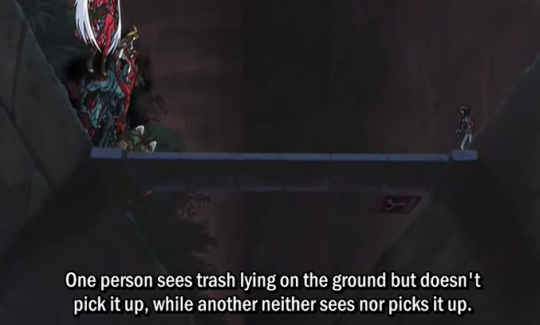
Satou: Now, which one is at fault? Judai: Isn’t it the guy who saw it, but didn’t pick it up. Satou: Not quite. If one is aware of the trash that fell, it may be picked up someday. But there is no possibility fo the unaware one ever picking it up. Judai-kun you are the foolish one unaware of the trash that has fallen. Judai: Are you calling me out for how I am? Satou: Your behavior towards me was atrocious. The worst was attending class only for credit, even if you were there you only slept. Judai: Yeah, I know. I was all bad, but it wasn’t that big a- Satou: It is important. You see, one by one, the students inspired by your attitude were losing their motivation. Now if you were a mediocre duelist, then this would not be an issue. Satou: However, you are the same hero who defeated the three mythic demons. Every single student in the academy admires you. You should have been a model for this academy. Judai: Me, a role model? Are you kidding? I just do whatever I feel like doing. Satou: Great power comes with great responsibility. Yet, as you remain unaware of that, you’ve spread your lethargy and self-indulgence.
seems like a minor issue, but look how Judai responds to the accusations. “I just do whatever I feel like doing.” Satou is arguing that Judai should pay attention to the influence he has on others because of his power, because how he chooses to use that power affects others. However, Judai chooses to actively not look at the consequences of his actions because he doesn’t want to take on that level of responsibility, and therefore he’s looking away from the trash.
While it seems like it doesn’t matter in Satou’s specific example, not thinking of the consequences, or how you use your power can have unexpected consequences. Spiderman doesn’t feel like it’s his responsibility to stop a bank robber, and that bank robber shoots his uncle. You could still argue it’s not Spiderman’s responsibility to stop every crime in the world, and I guess no one owes anyone anything from that point of view - but Spiderman failing to act responsibility had the consequence of directly hurting someone else.
Spiderman has to live with that consequence because it was his own Uncle that was hurt. This is where we really reach the duality of Judai.
In GX, Judai is, symbolically speaking, The Fool of the Tarot Deck, the Novice Alchemist — a person brimming with infinite potential, yet one who is also supremely ignorant, who walks forward with his eyes closed and often unknowingly causes harm in his great ignorance. In this, he is very much the embodiment of the faults we most commonly associate with teenagers — selfishness, recklessness, shallowness, a lack of dedication or empathy when it’s most needed. Like most people, he has good traits that work to balance out some of the above, but his narrative path through GX ends up being that of the flawed hero undone by his faults — and then that of the atoner, the repentant sinner. In his case, the mistakes of his teenage years are the catalyst for his growth from a boy into a man burdened with duty and purpose. Judai is someone with infinite potential, with great power, but also ignorant on how he should use that power, and that makes him an incredibly flawed hero who needs to learn how that power should be used.
Deku similarly exists in a society where heroes deliberately turn a blind eye to the suffering of a certain type of victim. Shigaraki’s speech heavily resmebles Satou’s speech about garbage on the side of the road.
Shigarali: "For generations you pretended not to see those you coudln't protect and swept their pain under the rug. It's tainted everything you've built."
Deku shares Judai’s ignorance, because he’s not only a part of a system that doesn’t even see trash on the side of the road, but he also worships heroes so much that he’s incapable of criticizing them. If Deku saw the flaws of heroes, but at first didn’t have the courage to speak out, but eventually gained the courage that would be one thing. However, if he doesn’t see the flaws of heroes, then the problem will never be fixed.
There are also consequences for both Judai and Deku failing to use their powers responsibly. These consequences take the form of the villains who came about because of all of society’s ignorance to the suffering of victims (Shigaraki) and because of the main character’s ignorance to their suffering (Yubel). Shigaraki and Yubel are also explicitly victims that the heroes failed to save, turned into villains who are active threats to the heroes.
Should I save the villain?
The answer is yes, because the decision to save is reflective of the kind of hero each character wants to be. Each story clearly sets up that Deku and Judai aren’t punisher style heroes who shoot their villains, they are being set up as heroes who save. Deku needs to “save by winning.” As for Judai, a big deal is made of Judai’s admiration for another character Johan who represents a more idealistic kind of hero. Johan unlike Judai is someone who duels with a purpose, something Judai outright says he admires because he’s empty in comparison.
Judai: Johan what have you been dueling for? See, it’s about fun for me… Well, for the surprise and happiness too. I guess I do do it for the fun. Sorry, I guess I put you on the spot by asking out of nowhere. Johan: What’s this about Judai? Judai: It’s nothing. Johan: I suppose there is one goal I have. Johan: Even if someone doesn’t have the power to see spirits, they can still form a bond with a spirit. That’s why I do it for people like him. [...] Johan: I'll fight for everyone who believes in me, and I'll do it with my Duel Monsters. Judai: I'm jealous you've got feelings like those in you.
Becoming a hero who uses their power to help others isn’t just a goal the story sets for Judai, it’s a goal that Judai sets for himself because of his admiration for Johan. Johan represents the idealistic hero Judai wants to be, but is also held back from because of his personality flaws. Johan represents the kind of heroic ideal that Deku is aspiring to be.
Johan’s ultimate goal isn’t punishing the wicked, but to use his power to save others.
Johan: Judai, it was my dream to save everyone through my dueling!
The story sets up the idea that it’s not enough for Judai to simply be strong, he’s also challenged to become a savior who uses his power to help others like Johan. Deku needs to “save by winning” and Judai needs to “Save everyone through his dueling.” However, Johan also adds another condition to what saving means. His idea of saving isn’t to defeat a villain, but rather his dream is to help connect spirits and humans together, even if there are humans who can’t see spirits. Johan doesn’t save people with the power of physical force, but rather the power of human connection.
Should I save the villain?
Here the answer is "Yes", because wants to become more like Johan someone who uses their power to help others not just for themselves. Then we reach the third question
If I don't save the villain, can I really call myself a hero?
It once again comes to power and responsibility. Heroes have great power, and they are responsible in how they use that power, if they use it irresponsibly then there are consequences. Shigaraki wants to destroy hero society, because the heroes irresponsibly use their power to turn a blind eye to everyone’s suffering.
People suffer when heroes fail to live up to their responsibilities. The entire conflict of season 3 is created by Judai failing to save Yubel. If Judai had helped Yubel when they most needed it, instead of abandoning them, then Yubel would never have been twisted by the light of destruction, would never have attempted to teleport the school to another dimension, would never have attacked all of JUdai’s friends.
These consequences matter. Deku can turn his eyes away from Shigaraki’s suffering, but let’s say a hero failed to stop a robbery, or rather he didn’t even try, and because of that his mom was shot and died in the street. Would Deku consider the man who failed to stop a bank robbery a hero? When Spiderman let a bank robber go instead of trying to stop him, was he being a hero in that moment? Both the stories and the characters themselves have defined heroes as people who use their powers to save others, therefore if Judai and Yubel fail to save their villains then they can’t be called heroes by the story’s own definition. Now let’s finally return to the question of "Can I save the villain?"
Was there ever someone you couldn’t save?
m going to start with Yu-Gi-Oh Gx as a positive example of how to save your villain. Gx works for two reasons. One, it’s established from the start that Yubel isn’t beyond salvation, and two, it makes it so Judai can’t win without saving Yubel. The conflict of the story does not end until Judai makes the decision to save Yubel. In some ways the writing is even stronger because Judai is directly responsible for the pain and suffering that Yubel went through that turned them into a villain in the first place. Yubel isn’t just a victim, they’re specifically Judai’s victim.
Yubel is a duel spirit who is also essentially Judai’s childhood friend. A duel spirit just like the kind that Johan wants to save. During their childhood Yubel got too overprotective of Judai, and started to curse his friends for making him cry or upsetting him in any way. Until everyone Judai’s age started avoiding him and Judai became all alone with only Yubel for company. Judai’s decision was to abandon Yubel at that time. He took the yubel card and shot them into space, hoping that being bathed in space rays will somehow “fix” what was wrong with them. I know that’s silly but just go with it. Judai abandoning Yubel had the unintended consequence of Yubel being subjected to the light of destruction, a corrupting light that subjected Yubel to years of pain. This pain literally takes the form of Yubel burning alive.
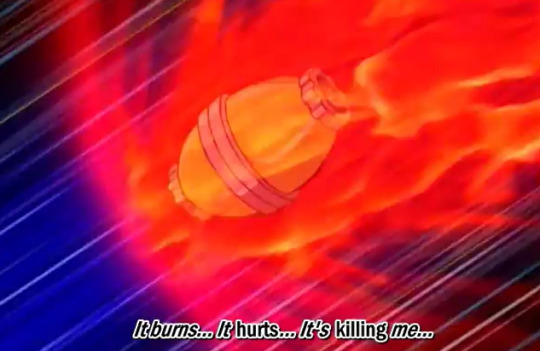
Yubel connected to his dreams called out for Judai every night, only for Judai’s parents to give him surgery that repressed his memories of Yubel causing him to forget them entirely. Yubel then spent the next ten years alone in space, continuously subjected to painful torture, with their cries for help being ignored.
"I was suffering even as you came to forget about me..."
Yubel is then met with the question of how can Judai treat them this way if they loved him so much? As from Yubel’s perspective, they’ve only ever tried to protect Judai, only for Judai to not only throw them away, but subject them to painful torture and ignore their cries for help. Judai effectively moves on with his life, goes to duel academy, makes friends while Yubel is left to suffer in silence all but forgotten. This is where Judai’s ignorance has serious plot consequences.
It’s not just the pain that Yubel endured that made them snap. It’s that their pain went ignored.
Yubel holds out the faint hope that Judai will answer their calls fro help until they finally burn up upon re-entry into earth’s orbit. At which point they’re left as nothing more than a single hand crawling on the ground. Yubel who cannot fathom why Judai would cause them so much pain, and then forget about them, convinces themselves that Judai must be causing them pain, BECAUSE he loves them.
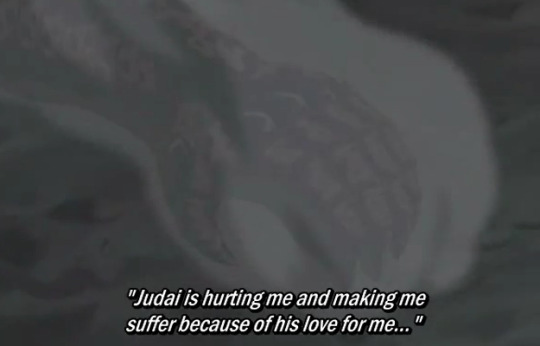
But you see, I couldn't possibly forget about you in the time that I've suffered...
Judai is allowed to move on with his life, to make friends, to spend the next ten years doing so while Yubel is subjected to ten years of agony. When they finally escape their painful torment, they see all the friends Judai has made while they’re left alone and forgotten. However, Yubel’s goal isn’t revenge. Rather, it’s to make Judai share and recognize their pain. WHich is why I said it’s not the fact that they were made to suffer, but their suffering is ignored. Yubel’s entire philosophy revolves around the idea that sharing pain is an expression of love, and that they and Judai share their love for each other by hurting each other.
"That's why I sought to fill all those linked to you, your world, with both sadness and anguish..."
For Yubel, making all of Judai’s friends suffer and Judai themselves suffer is a way of making them and Judai equals again. They want to show “their love” for Judai, but it’s more about forcing Judai to recognize the pain he’s caused them by forcing him through the same pain. Yubel’s philosophy of sharing pain is actually a twisted form of empathy.
They’re not entirely wrong either, that even people who love each other can cause each other pain, and that if one person is suffering alone in a relationship or the suffering is one-sided then there’s something wrong with that relationship.
Yubel: I get it now… You weren’t in love, with Echo. Yubel: No.. you may have loved her just enough to clear the conditions in palace for you to control Exodia, but the you didn’t truly love each other. Yubel: You were only unfairly hurting her, while you stayed unharmed. You wouldn’t suffer. You wouldn’t suffer. You wouldn’t be in pain. Amon: What are you getting at? Yubel: I’ve been hurt! I’ve suffered! I’ve been in pain. That’s why I’m making JUdai feel the same things I did!
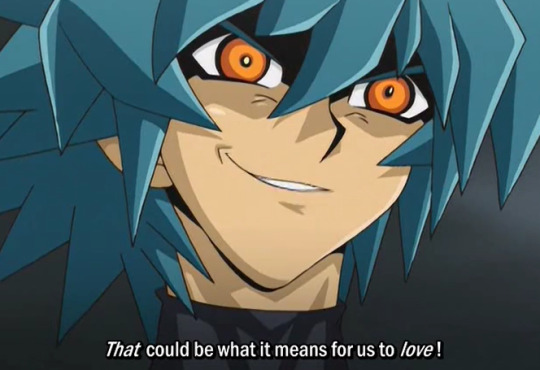
Yubel’s twisted theory of love, is a pretty thinly veiled cry for empathy.
They break out into tears when talking to Amon about the way they’ve hurt and suffered. They clearly state upfront that their goal is for Judai to recognize their love. One of the first things they say to Judai is a plea for Judai to remember them.
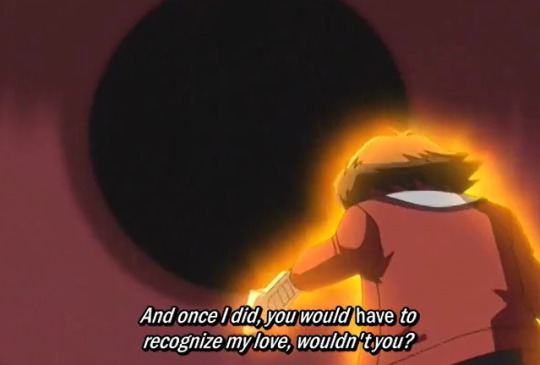
Yubel is presented as a very human character suffering through a lot of pain throughout their entire villai arc, they break down into tears multiple times, they cry out in agony, they're visibly suffering and you see their mental walls begin to break down when Judai denies them any empathy.
Yubel is actually incredibly clear and straightforward about their desire to be saved by Judai. However, Judai doesn’t lift a single finger to help Yubel the entire arc, even though they themselves admit they are directly responsible for Yubel’s suffering but they helped create who they are today.
Judai plunges into a different dimension and gives up everything to save someone, but it’s Johan, not Yubel they try to save. You have Johan, the perfect friend, and perfect victim that Judai gets obsessed over and will not stop at anything to save, and then you have Yubel, the imperfect victim that is actively harming Judai and all of his friends that Judai chooses to ignore. The whole season Judai only focuses on saving the perfect victim Johan, and this is clearly shown to be a flaw. Judai doesn’t just ignore Yubel to save Johan, he also ignores every single one of his friends.
Judai only caring about saving Johan, and deliberately ignoring and abandoning the friends who came with him to help, essentially abandoning them the way he did Yubel leads to another consequence. After he abandons them they get captured, rounded up, and actually die and become human sacrifices.
Losing his friends, causes Judai to snap. Judai becomes the supreme king and decides power is all that matters; he starts killing duel spirits en masse in order to forge the super polymerization card. Which means being left alone, suffering alone, being abandoned by everyone causes Judai to snap the exact same way that Yubel did.
In fact Judai is only saved from his darkest moment, because two of his friends sacrifice their lives, trying to get through to him and appeal to his humanity. At that point Judai’s friends could have just chosen to put him down like a mad dog, to punish him for the amount of people he’s killed, but instead they try to save him because of their friendship.
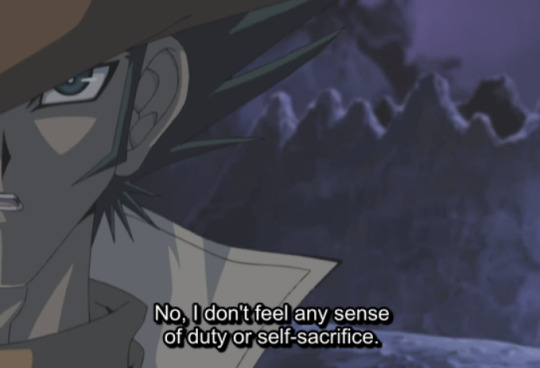
I just want to save my friend. That is all.
By the time Judai is facing Yubel in their final fight, Judai doesn’t have the moral highground against Yubel in any way whatsoever. They’ve both lashed out because of the pain they endured and killed countless people in the process of lashing out. The only real difference between them is that Judai is lucky. He had friends to support him at his lowest point, while Yubel didn’t. Does Judai learn from Jim’s example, and go out of their way to save Yubel the same way they were saved because Yubel is still a friend? Nope, Judai tries to kill Yubel at this point.
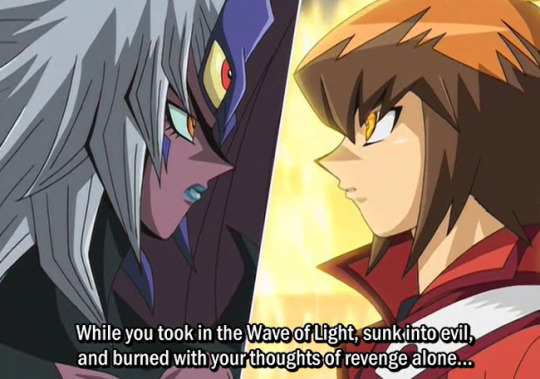
I made a lot of friends... And they all taught me something… real love is wide enough, large enough and deep enough to fill the universe. Your so-called love is only a conceited delusion.
Like, Judai, sweetie baby honey darling. How was Yubel supposed to make friends when they were floating in the empty void of space?
Judai hasn’t learned, they are still ignorant, and still turn a blind eye to Yubel’s suffering. After all if his love is wide enough, large enough,and deep enough to fill the universe then why don’t thy have any room in their heart whatsoever for empathizing with Yubel?
Judai making friends while Yubel was trapped in space doesn’t make Judai a better person than Yubel, it makes Judai lucky. Judai doesn’t even appreciate that luck, because he treats his friends like garbage. It’s not about whether Yubel is worthy of salvation, because Judai is a mass murderer and his friends still went to great lengths to save them anyway. It’s that Judai doesn’t want to empathize with Yubel, because they still want to remain ignorant and irresponsible. Judai wants to continue playing hero, with a very black and white definition of what a hero is. By this point Judai’s killed lots of people, but if he makes Yubel the villain in the situation, he can keep playing hero. He doesn’t have to look at himself and what he’s done, because blaming everything that happened on Yubel and then putting Yubel down like a mad dog allows Judai to absolve his own guilt. Judai practically ignores Yubel’s cries for help, even when Yubel spells it out for them.

I couldn't have lived with the heartache unless I felt that I was being loved...
At this point Yubel themselves acknowledges that their love was just a delusion. That it was a coping mechanism, because they couldn’t live with all the pain otherwise. WIthout it they would have just died, which makes Judai unmoved. The implication here is that Judai thinks yes, Yubel should have just died in that crater. It would have been easier for Yubel to die a perfect victim, then for Yubel to crawl out of that crater and go on to hurt other people. While that may be true the same can be said for Judai - it would have been better if Judai died rather than become the Supreme King. His friends could have put him down like a mad dog, you could have even called that justice - but they didn’t. Judai making no attempt to save Yubel isn’t because he thinks it’s morally wrong to save someone who’s killed as many people as Yubel has, or because he thinks he can’t forgive Yubel, it’s because Judai is taking the easy way out. Johan is a nice, easy victim to save, because he’s Judai’s perfect boyfriend, while Yubel is a complex victim that requires Judai to understand their suffering. Even the act of saving Johan isn’t about Johan himself, it’s about the fact that Judai feels guilt over Johan’s disappearance. What Judai wants isn’t really to save a friend, but to stop feeling guilty over that friend. Judai isn’t just disgusted by Yubel’s actions towards his friend, he also wants to avoid the guilt he feels over causing all of Yubel’s suffering, because it requires acknowledging the complex reality that he is both victim and perpretrator in this case, just as Yubel is both victim and perpetrator.
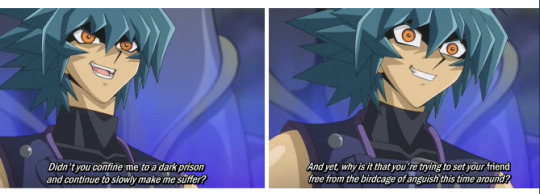
So how can an arc where Judai doesn’t try to save Yubel until the last possible minute, be better than an arc where Deku makes it his goal for the final act of the manga to save the crying boy in Shigaraki?
It’s because the story does not let Judai get away with his continual refusal to empathize with Yubel. Yubel’s entire character revolves around empathy, in the form of sharing pain. As a duel monster, Yubel’s effect is that they are a 0/0 attack monster who is immune to all damage, but when you attack them they deal all the damage back to you. Which means that Yubel will respond to all the pain they feel, by causing you just as much pain in return. Yubel is not a character who can be defeated in a fight, or a duel. In fact they’re the only Yu-Gi-Oh villain who never loses a duel once. The most Judai can do is duel them to a draw, and they draw three times. Yubel wins against everyone else who challenges them. In a way Yubel is like Shigaraki, the ultimate, unkillable enemy that can’t be done away with violence. Judai’s refusal to empathize with Yubel or attempt communication also makes them worse, every time Yubel is hurt they escalate. THe more Judai hurts them, the more they will hurt in return, it’s a cycle that will never be broken simply by killing Yubel, because Yubel is unkillable.
Not only that but the story has gone to great lengths to show that saving Yubel is the correct course of action. If Judai doesn’t save Yubel, he’s basically spitting on the selflessness Jim showed in saving him. In fact if he doesn’t save Yubel, Judai is contradicting his own words on what makes a good friend. Sho once asks Judai after witnessing his brother change, what he should do if a person you lov ehas changed into an entirely different person. What if they're a person you don't even recognize any more? A person you don’t even necessarily like anymore?
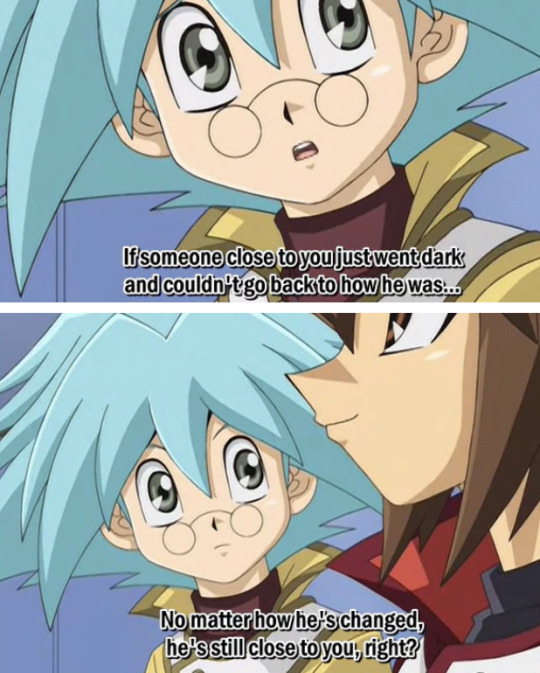
That's why if it were me. I'd probably just be looking after him until the very end, even if I didn't like him. I'd do it cause I think it'd prove that I care about him.
Judai doesn't even say that Sho is obligated to save his brother or morally redeem him, just that he has to keep looking at him instead of turning away or ignoring him.
Judai is being a bad friend, by his own definition. By choosing to deliberately look away from Yubel, Judai’s not living up to his advice for Sho for how you treat people you care about.
Which is why the resolution for Judai and Yubel’s arc is so important, because it’s done by Judai finally acknowledging Yubel’s pain, and promising to watch over them from now on, words that are followed by the action of physically fusing their souls together so they’ll never be alone again. Judai doesn’t just say pretty words about how they won’t ignore the crying child inside of Yubel, but instead he makes a sacrifice to save Yubel at risk to themselves to show their words are backed up by actions. Judai says Yubel will never be alone again, and then he commits.
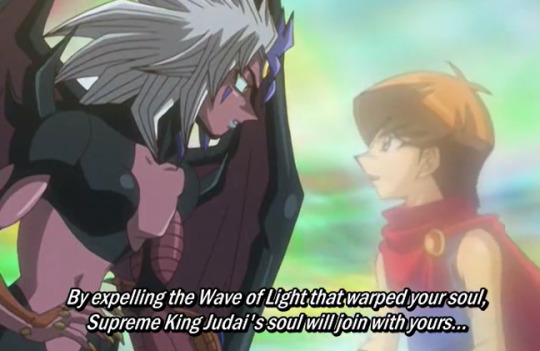
"And even if that means I won't exist anymore... I don't care."
Judai has resolved his character arc by this action, because Judai is finally taking on responsibility and that responsibility is watching over Yubel, so the two of them can atone together. Judai even says himself this isn’t an act of sacrifice on his part, but rather him finally accepting adult responsibilities.
Judai: I wouldn't sacrifice myself for you guys. I'm just going on a journey to grow from a kid into a man.
Judai needed to save Yubel to complete his character arc and grow as a person. If Judai hadn’t saved Yubel, he would have still remained an ignorant child. By learning not to turn a blind eye to Yubel’s pain, and also smacking sacrifices and physically doing something to atone for the way they ignored Yubel up until this point they’ve not only saved Yubel they’ve also done something to address their wrongs. This also continues into the fourth season where Judai’s personal growth results in him learning what kind of hero he wants to be as in Season 4 in order to atone for the spirits that Judai slaughtered, he decides to leave his friends behind and walk the earth with Yubel helping spirits and humans get along with each other. In fact Judai’s final speech as a character isn’t even about how strong he is as a hero, but how weak he is as a person.
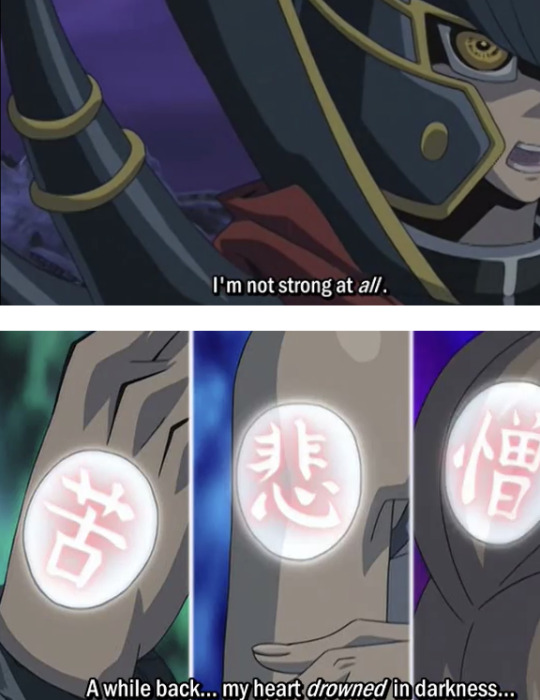
And I put my friends through some rough times. Form that, I figured a few things out... all I can do is believe in them.
The lesson Judai learned is because he’s weak, he needs to empathize and believe in other people the same way that his friends once believed in him when he was at his lowest point. Judai’s not the strongest hero, he’s the weakest one, but that gives him the ability to empathize with people who were lost just like he was, and guide them back from the darkness.
The story of how Deku became the worst hero.
I’m going to say this right now it might turn out next week that Shigaraki is just fine, and he’ll use the overhaul quirk to reconstruct his body. However, even if that happens Deku has completely failed at his goal of saving Shigaraki for the reasons I’ll illustrate below. In theory, Deku’s arc of saving Shigaraki, and therefore winning by saving should be much easier for the story to accomplish and also much less frustrating to watch. After all, Shigaraki has been around since the beginning of the manga, he’s literally the first villain that Deku faces. He’s also the first villain that Deku talks to, where he brings up the idea that there were some people All Might failed to save. There’s also many intentional parallels between the two characters, the entire manga is about their parallel journeys of becoming the next generation hero and the next generation villain. Shigaraki even directly quotes the line at one point that all he wanted was for someone in his house to tell him he could still be a hero, the same line Deku said in the first chapter was that he wanted his mom to tell him to be a hero instead of apoalogizing to him for being quirkless.
Not only is the setup for Shigaraki and Deku made obvious (Deku can redeem Shigaraki by telling him that he can still be a hero too), but Deku himself states out loud that he wants to save the crying child inside of Shigaraki.
Judai runs away from Yubel the whole time, whereas Deku is running towards Shigaraki and actively makes it his goal to understand Shigaraki and continue to see him as a human being rather than a villain. The story also makes it clear that saving Shigaraki is necessary to saving hero society as a whole. After all Yubel is just Judai’s victim. Whereas Shigaraki is the victim of all of society. He’s the crying child who was ignored. The cycle won’t be broken if heroes continue choosing to ignore people like Shigaraki, because more victims will grow up to replace him.
Shigaraki: Everything I've witnessed, this whole system you've built has always rejected me. Now I'm ready to reject it. That's why I destroy. That's why I took this power formyself? Simple enough, yeah? I don't care if you don't understand. That's what makes us heroes and villains.
Shigaraki rejects the world because the world continues to reject him. THe solution to this problem is not rejecting Shigaraki, because Shigaraki won’t go away, the system will just continue to reject people like Shigaraki. As long as heroes and villains don’t understand each other, they’ll keep being forced to fight and the conflict won’t end, because hero society is what engineers it’s own villains.
clear as day by the story itself. If the objective of saving Shigaraki is clear, then how exactly did the story fail in this objective? What went wrong? In this case it’s a failure of framing, and breaking the rules of “show don’t tell.” Stories are all about actions and consequences. When a character makes a certain action in a story, the way other characters around them, the world, and whatever consequences that action frames that action in a certain light. It provides context for how we are supposed to interpret that character in that moment.
For example, when a character does something wrong and another character directly confronts them over what they did wrong, that frames them as in the wrong. The story is criticizing the character for what they did wrong. Context is everything in a story. Stories are just ideas, so they require framing and context to communicate those ideas for the audience. Certain character attributes can be strengths or flaws depending on the context. My go to example is that if you put Othello in Hamlet, the conflict would be resolved in five seconds because Othello’s straightforward personality and determination would have him kill Hamlet’s uncle without questioning things. Whereas, Hamlet constantly questioning and second guessing himself would lead to the worst ending possible. However, if you put Hamlet in Othello, then Hamlet wouldn’t fall prey to Iago’s manipulations, because Othello doubts and questions everything so he wouldn’t believe Iago the way Othello did.
Hamlet’s contemplative and introverted nature can be a strength in one situation, and a flaw in another. Othello’s tendency to act without thinking things through can be a strength in one situation, and a flaw in another. Context matters, because context tells you how you’re supposed to interpret a certain characters actions, and therefore tells you more about that character. This is why people repeat “Show don’t tell” as the golden rule of storytelling, it’s one thing to say something about a character, it’s another to us the characters actions in the story itself to show them something about the character.
What’s even worse then breaking the rules of show don’t tell however, is telling the audience one thing, and then going onto show in the narrative something completely different. In that case the narrative becomes muddled and confusing to read. If I the narrator say “Hamlet is someone who overthinks everything” and then in the story Hamlet walks up to his uncle and kills him with no hesitation, then the narrator is straight up unreliable. It becomes impossible to tell as an author what message I’m trying to get across about these characters, because I’m telling you one thing and showing another.
This is why the writing fails in the second half of My Hero Academia because we are constantly told one thing, but then the story shows something entirely different and sometimes even contradictory to the thing we are being told.
Judai is a much worse hero than Deku, he always runs away from Yubel, and we’re never directly told that he’s supposed to save Yubel either. However, the narrative is incredibly consistent. Judai’s behavior of running away is consistent with his character. All the other character call Judai selfish for abandoning his friends (and they’re not even talking about Yubel). Judai is never painted in any positive light for his actions, therefore we as the audience understand Judai’s behavior is wrong and he needs to fix it. The narrative makes it clear that Judai needs to grow up, and Judai is never rewarded for his refusal to grow up, he’s ruthlessly chewed out, not by his enemies but also by his own friends. However, the narrative isn’t merciless on him either. Season 3 of GX is dark, but it’s not grimdark. Even when Judai loses his way, he’s still shown love and compassion by those same friends who go to great lengths for his sake. The narrative criticize Judai but it never insists that he’s beyond redemption and needs to be put down like a mad dog.
The message is very clear, that not only does Judai need to grow up, but he also deserves the chance to grow and change, which is why he should give Yubel a similar chance. In comparison the story sets out this clear narrative arc for Deku of understanding Shigaraki, but it never challenges him for failing to understand Shigaraki. If you listen to what the narrative says, how other characters describe Deku, and what Deku himself says and only read it on a surface level then yes, Deku’s goal is to save Shigaraki. If you analyze actions however, he is in effect just like Judai he never takes any meaningful action or steps towards Shigaraki, nor does he think of what saving Shigaraki might look like or entail.
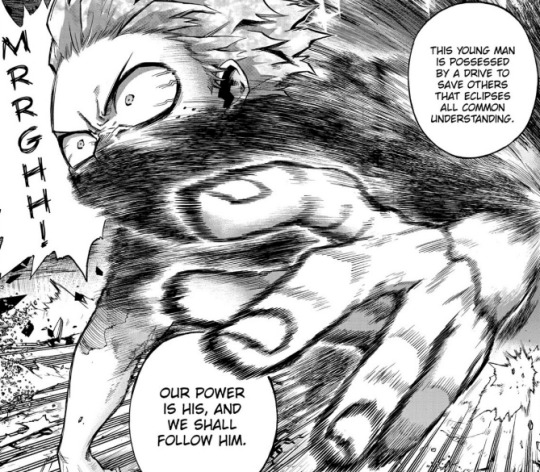
The story describes Deku as someone who is possessed by a drive to save others that eclipses all common understanding, but does the story give us any examples of that behavior?
Judai is characterized as a selfish, irresponsible child, and the story gives us countless examples of his immaturity and how it hurts others. Does the story of MHA do the same for Deku's purported virtues? Let’s run through Deku’s actions, step by step, the actions themselves and how they are framed in order to find any evidence that Deku possesses this drive to save others. Does Deku reflect at all on the question of:
Can Shigaraki be Saved?
Deku leaves on a journey to try to understand villains. When he makes a perfunctory attempt to understand and empathize with Muscle, and Muscle replies that some people are just evil does Deku keep trying to reach his heart? Nope, he just punches him.
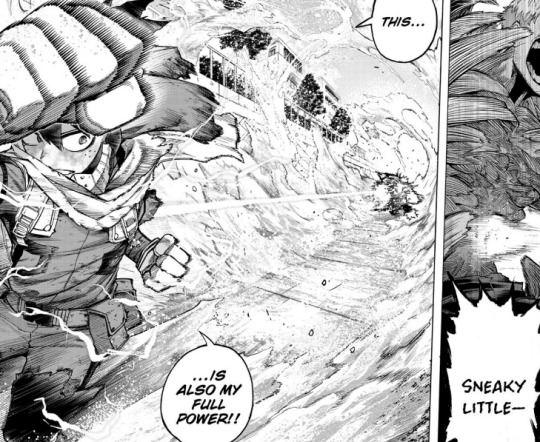
Well, if he’s failed in his goal of understanding a villain then does the story call him out on his failure? Does Deku face any sort of narrative consequence for that failure? Is he framed negatively for failing to understand Muscle, the same way that Judai is framed for abandoning Yubel? Nope. Deku doesn’t express any frustration at all over is inability to reason with Muscle. There’s also no negative consequence for Deku just choosing to punch muscle, it turns out that there was no reasoning with Muscle and some people are just bad eggs so Deku was right. It’s okay for characters to fail, but if a character fails and it’s not framed by the story as a failure then the writing itself as failed. Why even bother to include this scene in the first place if it doesn’t advance Deku’s character in any way? This scene in spite of showing Deku failing to understand someone actively paints Deku in a positive light, because of how much stronger he is ow that he can OHKO a guy that gave him trouble all the way back in the camp arc.
This scene doesn’t tell anything about Deku as a character, it just makes him look cool. In fact that’s precisely the problem, Deku isn’t adequately challenged as a character, because he’s never allowed to fail. Even when he does obviously fail at the things the narrative set out for him to do, he’s never challenged on those failures, because the priority isn’t to make Deku grow, it’s to make Deku look good. As I said before, Judai is the hero because he’s the weakest. Deku is the hero because he’s the strongest. Well, next a big flaw on Deku’s part is that he worshippd the same heroes that were making the world corrupt. Heroes like Endeavor who created people like Dabi. So, does Deku take action to either criticize the older generation of heroes, or separate himself from them in order to try to be better than them? Nope, he teams up with them. Not only that, Deku can’t do something as simple as tell Gran Torino out loud about his plans to save Shigaraki. If Deku feels that Shigaraki is worthy of salvation then he should at least try to make an argument here about his ideal of saving others.
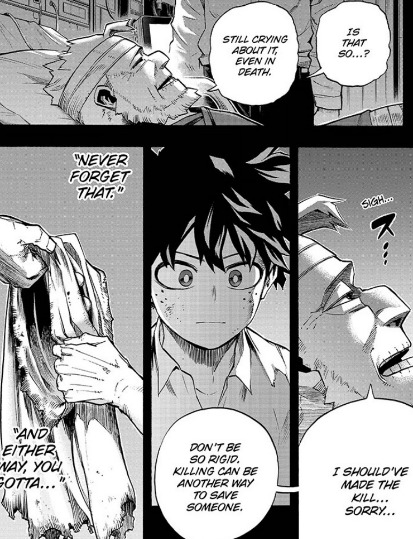
Now here’s the thing, if Deku hadn’t directly looked at the camera and told us he wanted to save Shgiaraki, would we be able to deduce his intentions from his actions? If you took away all of Deku’s internal monologue, and just showed him punching Muscular and saying nothing when Gran Torino says he may have no choice but to kill Shigaraki would anything about Deku’s actions indicate that he wants to save Shigaraki? Let me use avatar the last airbender as a positive example for a moment. People say that Aang’s desire to spare Ozai’s life comes out of left field, but like if you analyze Aang as a character down to their bending, and the way they react in situations they always prefer de-escalation, or taking a third option as opposed to confronting things head on. It’s literally why Toph says Aang has trouble learning earth bending, because as an airbender, he always tries to look for some other way to solve the problem, instead of a direct confrontation with force. As early as season one, Aang tells Zuko someone who has tried to kill him several times that he was friends with someone from the fire nation one hundred years ago and in a different situation they could be friends. Aang’s desire to save the Firelord may not have been told to us until the last possible minute, but Aang’s aversion to violence has always been a part of his character from the beginning. However, Deku never shows any similar aversion to violence. There’s basically no example where he ever tries to de-escalate a situation, or he avoids a conflict by seeking a third option.
Anyway, let’s move onto the next example. In the confrontation where Lady Nagant fights Deku, when Deku learns the fact that the heroes were employing government hitmen to attack people for uhh… exercising free speech does Deku give any reaction to this information? When Lady Nagant says that Deku is only going to bring back the status quo, does he show her any meaningful evidence that he won’t do that.
Deku’s response is because the world is so grey, he needs to extend a helping hand to others. Which you know what thay could be a response. Deku saying that his response to the corruption of the hero world is that he now understands that society led some people down the wrong path, so his way of addressing the wrongs of that society is lending a helping hand to as many people as possible even people he used to think was irredeemable.
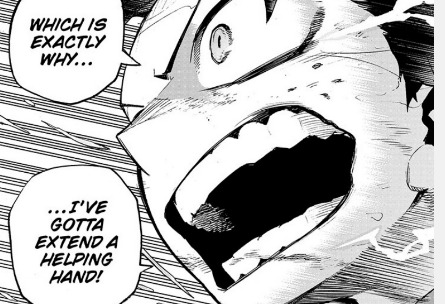
I will give Deku the benefit of the doubt, I think this is an acceptable answer. I can’t save everyone, but that’s not going to stop me from trying to save as many people as possible and maybe I can save people who were this society’s victims on the way too. However, does Deku demonstrate his resolve to extend a helping hand in any meaningful way.
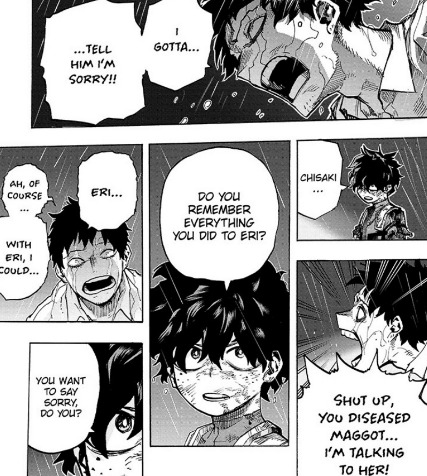
Deku is met with an armless, insane Overhaul who’s begging for someone to help heal his father figure in the Yakuza from his coma. This isn’t like Muscular who insists that there’s no helping him, Deku is met face by face with someone asking him for help. Deku’s gotta extend a helping arm whenever he can, because he knows some people were abandoned and led astray by this society… Unless that person is someone he doesn’t like personally. At which point he only helps them on a conditional basis. We are told Deku will save anyone and everyone, but Deku is met face to face with an armless man who is begging for help and Deku’s does nothing to help him. Deku’s not criticized for refusing to help overhaul either, it’s never brought up again. When Deku begins to experience a mental breakdown because of all the people he’s trying to help in the Dark Deku arc, we are told this is the result of Deku trying to save everyone, but we do not see Deku attempting to save a single villain after Muscular and Nagant.
He exhausts himself beating up villains that AFO sends after him, and only helping innocent civilians. Which would be fine if this arc were about how Deku is running away from his real responsibilities the same way that Judai was running, but that’s not what we’re being told. We are told that this is all part of an arc of Deku learning to understand villains and be a hero.
Deku is asked “Can you save Shigaraki?” by the story, but Deku never at any point has to deliberate on that question. Judai doesn’t deliberate on that question either, but him choosing not to think about things and stay ignorant is the point.
It’s actually fine to make Deku stagnate as a character. It’s fine to have him take the easy way out by just punching villains and giving up on them after one conversation. It’s fine for him to be empathetic to other people’s suffering, or even self-righteous. It’s fine for him to be ignorant.
He could be all of those things if it was a part of a narrative teaching him to unlearn his behavior. In fact the narrative might have been better if Deku started out by saying he didn’t want to save Shigaraki, that there was no choice but to kill him, because then at least his actions would be consistent with his words. Then his lack of empathy and his tendency to resort to violently beating up villains instead of avoiding violence would be character flaws he could work on. Deku however, is presented to us as this empathic hero who is always willing to give others a second chance though he never actually sticks his neck out in order to do so. Continuing on with our slow crawl through MHA, one of Deku’s friends is revealed as the traitor. Deku has a heartwarming scene fo saying that Aoyama can still be a hero, but look at his actions. He lets the adults in the room physically tie Aoyama in a straightjacket and imprison him, for the crime of… doing bad things while he was in a hostage situation. Apparently, if a bank teller helps the bank robber by giving them money when the robber has a gun to his head, the swat team should just snipe the bank teller. Not only does he not defend Aoyama against the adults, or stand up for him, or tell the adults they’re wrong to treat Aoyama a clear cut victim who had a gun to his head and was bing held hostage like he’s a villain - he also lets the adults use Aoyama an innocent victim as bait in order to lure out AFO. Deku tells Aoyama he can still be a hero, but he doesn’t defend Aoyama as a victim of being taken hostage, nor does he stop the adults from further taking advantage of him and throwing him right into danger. Some people are just led the wrong way that’s why they need to be extended a helping hand, but fuck Aoyama I guess. He needs to earn the right to be sympathized with by physically putting his life in danger.
Deku can’t even go out of his way to save a friend who he’s known for the better part of a year, when that friend is a complex victim forced to do bad things.
Then Deku and Uraraka have a conversation where they both, kind of ruminate on the idea that maybe the villains are human beings who are worthy of sympathy.
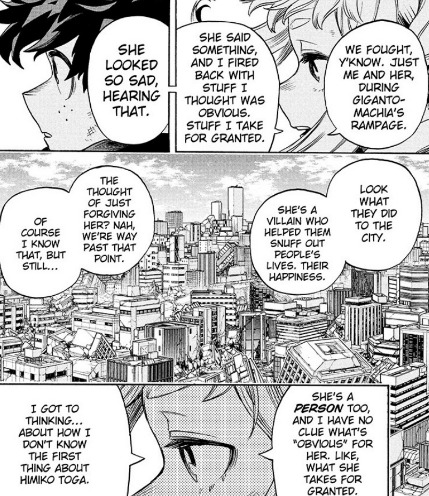
In fact Uraraka is actively trying to dehumanize Toga by looking at the destroyed city, so she won't have to think of Togaas a person.
The language here is also a major fault of this arc. It focuses far too hard on “forgiveness” over and over again. As I said before, saving Shigaraki isn’t about Shigaraki at all, it’s about Deku, and how he wants to use his power as a hero. Deku has even stated himself that he doesn’t believe that OFA is a power that should be used for killing people. So why does whether Toga or Shigaraki are forgivable or not even matter? It’s the same with Deku refusing Overhaul any sympathy. If he’s so morally opposed to abusers, then why does he work with Endeavor and defend him at every visible opportunity, even in front of his victims? Whether or not Deku can forgive Shigaraki doesn’t matter, because Deku is not the moral arbitrator or right and wrong. In fact Deku doesn’t even have any morals, so how is this a moral debate? Is there any point where Deku gives a clear definition of what he thinks right and wrong is? Does he quot Immanuel Kant to the audience?
Batman doesn’t kill people, not because he thinks that every last person on earth can be saved, but because Bruce Wayne an incredibly rich white man thinks that maybe he shouldn’t have the authority to decide who lives and who dies. When Bruce doesn’t kill the joker, it doesn’t mean he thinks the Jokers actions are forgivable, it’s because Bruce thinks it’s not his place to determine whether someone has the right to live.
The whole conflict that MHA presents us is that heroes pick and choose who to save, and only save the ones they deem as innocent. So, how does Deku saying repeatedly they can’t forgive Shigaraki contribute to that theme in any way? In fact by focusing on forgiveness, rather than whether or not he personally has the right to pick and choose who lives and who dies Deku is ignoring the elephant in the room. The question isn’t about whether Shigaraki’s redeemable or if his deeds should ever be forgiven. The question is whether Deku has the right to decide who gets saved and who doesn’t.
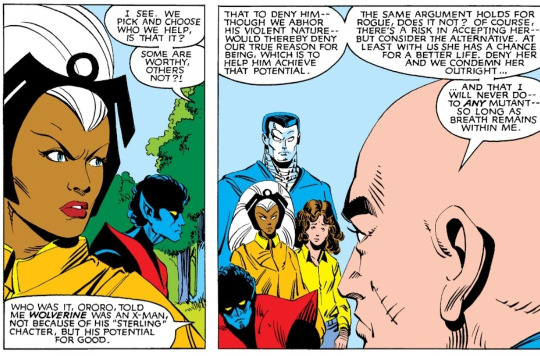
We are told that Deku as a character is someone who wants to save everyone no matter what, so Deku shouldn’t be focusing on whether or not Shigaraki is worthy of forgiveness, he should be making an idealistic argument like Xavier does in this panel. Why doesn’t Deku talk out loud with Uraraka on how he believes his power is for saving others, and not killing? If he’s meant to represent some idealistic hero, then why doesn’t he even talk about his ideals? Why don’t I as the reader know what those ideals are?
I think Xavier’s ideals of forcing the X-men to provide a good example to the mutant community, in order to try to earn the respect of other human beings is wrong, but at least he has ideals. He tries to inspire the other people around him to live up to those ideals. The story can criticize him for his ideals and point out how they’re wrong, while it can also uplift parts of his idelogy like where he believes there are no evil mutants. Deku has a chance to do the same to Uraraka, to tell her clearly, “I don’t think we as heroes have the right to pick and choose who we help…?” but he waffles. Not only does he waffle, but this moment is meant to be read as an indication that both Deku and Uraraka are sympathetic individuals who want to save their villains. They are supposed to look good and idealistic here and they don’t. For Deku it just seems like a repeat of his behavior with Overhaul. The only villains that are worthy of sympathy, are the ones that he personally decides are forgivable.
The story isn’t about whether or not it’s moral to save someone who’s killed as many as Shigaraki has. The story never seriously discusses any sort of complex morality or moral philosophy. Once again to bring up avatar, yes you can argue Aang sparing the life of a war crimminal is bad, but Aang mentions on multiple occasions that he wants to retain the cultural values of the airbending people. Aang has a morality, a consistent morality, it might not be a morality you personally agree with but at least he has one. Deku hates abusers, unless he’s next to Endeavor then he thinks abusers should be given the chance to atone. Deku doesn’t believe that One for All is a power for killing, but he never stands up to any of the adults who are blatantly trying to kill Shigaraki, he doesn’t even express out loud to Uraraka that he doesn’t think heroes have the right to decide who lives and who dies. In fact he’s given the perfect opportunity to, when Hawks kills a villain and it’s broadcast live on the news in font of everyone, but Deku never has anything to say about that. The reason Deku and Uraraka both put such an emphasis on “forgiving” their villains has nothing to do with the story itself. It’s because the author Horikoshi, is afraid that some people will misinterpret his story as saying that he actually thinks that saving a villain like Shigaraki means that he condones mass murder, so he has to have the characters talk about not forgiving Shigaraki.
Judai doesn’t have any consistent morals either, but once again that’s the point and something the story relentlessly calls him out on.
Cobra: Fortune would never smile on a fool like you who fights while prattling on about enjoying duels. Cobra: You are certainly a talented duelist. But you have one fatal flaw. Judai: A fatal flaw? Cobra: Yes, your duels are superficial. Someone who fights with nothing on his shoulders, cannot recover once he loses his enjoyment. What a duelist carries on his shoulders will become the power that supports him when he's up against the wall! Cobra: But you have nothing like that! Those who go through life without anything like that cannot possibly seize victory. Cobra: But I know that nothing I say will resonate with you... because you have nothing to lose but the match. Judai: I... Cobra: Afraid aren't you? Right now, you have nothing to support you.
Judai’s regularly called out for his superficiality. Judai is only a hero because he’s strong and wins fight, he doesn’t feel any responsibility towards other people, and in fact he loathes having to feel responsible for others. Judai isn’t just naive, he deliberately chooses to remain ignorant. Since he’s ignorant of his own faults, he makes awful decisions when it comes time for him to lead, and his friends die because of choices he made. We are told that Deku doesn’t want to remain ignorant, that he wants to understand villains, but Deku’s actual actions are him continuing to ignore society’s ills and the suffering of victims. In fact if you take away Deku’s internal monologue and the narration, Deku’s actions almost exactly mirror Judai’s.
Deku is just as superficial as Judai, and he also doesn't want to spend any time thinking about what kind of hero he wants to be, but the narrative never punishes him for it.
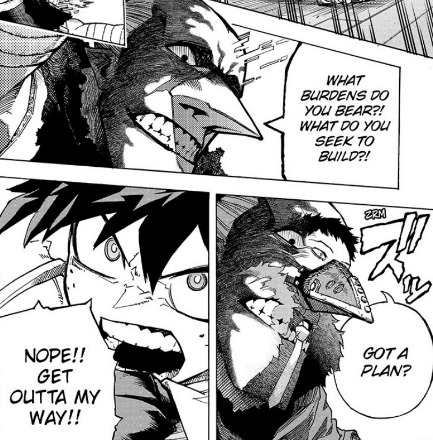
Judai is asked what burdens he has to bear and he has to meaningfull answer that question, Deku is allowed to get away with not having to think about anything. Deku remains superficial. Both Judai and Deku spend the entire arc running away from their villain rather than confronting them in any meaningful way. They both never express out loud any sympathy for their villain, or try to empathize. THey both never step down from the role of hero, and only confront their villain as a hero, because they don’t want to think about themselves as complicit or in the wrong. Shigaraki and Deku’s final confrontation mirrors Judai and Yubel’s but without the same clear framing. THe entire time Yubel is trying to get Judai to empathize with them, and Judai only responds with physical violence, because they don’t want to stop being the hero and because they can’t see Yubel as anything other than the villain. As soon as Deku arrives on the battlefield (by the way everyone else and their mom pointed this out, but Deku who doesn’t think OFA is a power for killing, is completely okay with a plan called the “Sky coffin plan” where every other hero was clearly trying to murder Shigaraki).
When Deku arrives he asks if Shigaraki is still in there, but he doesn’t do anything to try to reach Shigaraki, he jumps right to punching him. In fact he never tries anything besides punching him as hard as possible. How is punching Shigaraki with the force of a thousand suns saving him exactly? How is that different from how he tried to defeat Shigaraki the last war arc, before he saw the image of the crying child that made him want to try a different approach in saving Shigaraki? In Judai’s final fight with Yubel, it’s made explicitly clear that Judai is not trying to save Yubel, and that’s a fault on his part. In fact Judai gives the traditional “I have friends, and you don’t” speech to Yubel but it’s a subversion of how that speech is usually used. Usually that speech is used to show that the protagonist won because of they valued friendship,while the villain treated their friends poorly and only cared about power. However, it’s ironic in this case because Judai got all of his friends killed. Judai treats his friends like garbage. This speech isn’t used to show that Judai is winning because he values his friends more than Yubel does, it shows that Judai is a hypocrite, playing the hero in this situation where they are just as bad as Yubel. Judai’s not morally superior, he’s just lucky that he has good friends. Friends that were willing to save him. The only connection Yubel has to anyone else, Yubel’s only friend is Judai and Judai is a shit friend.
In fact, Mirio tries to give a version of the “You don’t have any friends” speech to Shigarkai, only for Shigaraki to get mad and tell Mirio that he does have friends and people he wants to protect.
This fact is also something that is blatantly ignored by Deku, even though Mirio tells him about it… even though we are told that Deku is trying his best to see the humanity in Shigaraki.
Judai blatantly admits they’re trying to kill Yubel. Which makes them a worse person, but a better character than Deku, because their actions are clearly framed by the narrative and consistent.
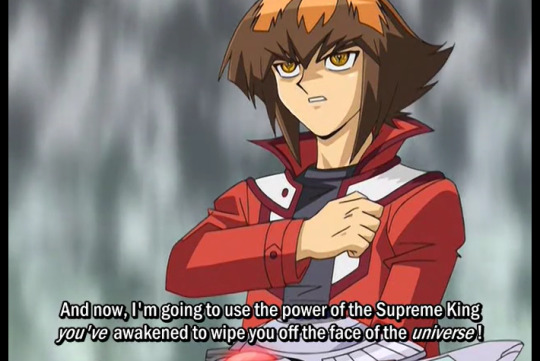
On the other hand we are told that Deku doesn’t want to kill Shigaraki, and yet everything Deku does makes it look like he’s just trying to kill Shigaraki and put him out of its misery. If we didn’t have Deku stating out loud that he wants to save Shigaraki and wants to see him as a human, there’d be nothing in his actions to indicate that he’s trying to avoid killing Shigaraki. Deku says he can’t pretend he didn’t see Shigaraki crying, but like, does he ever hesitate to punch Shigaraki, does he ever think that causing Shigaraki more harm is wrong when he’s already suffered so much? Deku says that Shigaraki is a person but does he treat him like a person? Does he try to talk to him like a person? To use avatar again, Aang does talk to Zuko pretty early on. Deku doesn’t even give the classic “We could have been friends under different circumstances” speech. When Shigaraki resists Deku’s attempts to see him as a person or emapthize with him, Deku’s response is to just resort to punching harder.
Which is in effect the same thing Judai does to Yubel, just kill them as a villain so they don’t hurt anybody else, but framed in an entirely different light. Judai is shown to be ruthless, and cold in his attempt to only settle the conflict with Yubel by violently putting them down. On the other hand we’re being told that Deku is compassionate and empathic while he punches Shigaraki with the force of a thousand suns.
There’s another eerie similarity between both of these final confrontations. At the climax of the confrontation, both Judai and Deku have a psychic vision where they see events from Yubel and Shigaraki’s childhood. This vision is supposed to help both characters understand the good in the villain they’re facing.
Let’s see the contents of this vision and how the visions change each character. Judai is shown a vision of his past life where Yubel sacrifices their entire body, and even their humanity to go through painful surgery to turn into an ugly dragon, all for the sake of protecting Judai in a previous life.
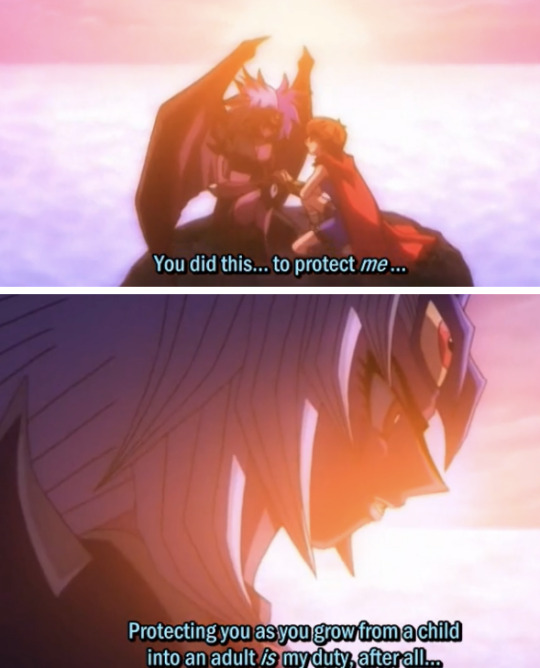
Judai is then forced to witness the good side of Yubel they’ve been ignoring all along to paint them as a villain. Yubel is simultaneously extremely selfish and willing to hurt people Judai cares about, but they’re also extremely selfless and will do anything to protect Judai and have made great sacrifices in the past for Judai’s sake. Deku gives lip service to not ignoring the humanity in Shigaraki, but Judai is literally forced to acknowledge the humanity in Yubel. Not only that, but Judai changes his behavior immediately after learning this new information. After seing the sacrifice that Yubel made for him in the past, Judai responds with a sacrifice of his own. A sacrifice that perfectly mirrors the sacrifice that Yubel once made for him. Yubel gave up their humanity for Judai, so Judai fuses his spirit to Yubel’s, becoming a human / spirit hybrid so Yubel no longer has to be alone.
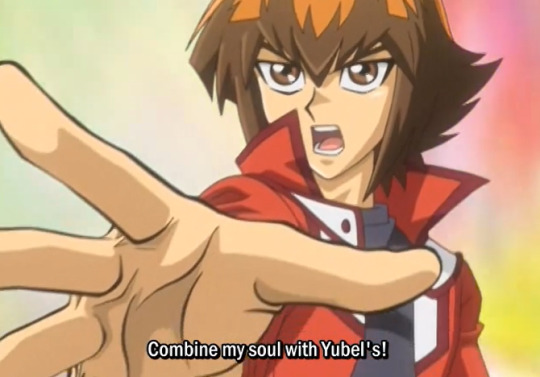
Judai also doesn’t just fuse their soul with Yubel’s in order to stop Yubel from destroying everything, it’s because both of them at this point need to atone together, and Judai is fulfilling his responsibility of watching over his friend until the end to prove that you care about them - as he said to Sho. Judai’s also fulfilling Johan’s dream of helping repair the bonds between spirits and humans, by reconciling with Yubel and repairing their bond. It’s also Judai atoning for his previous behavior of abandoning Yubel, by choosing to stay alongside them as they both atone together. Deku does sacrifice OFA during the fight against Shigaraki, but their sacrifice isn’t to help Shigaraki, but rather doing psychic damage to Shigaraki by using OFA is the only way to defeat them. He transfers OFA in order to break Shigaraki’s brain so he’ll stop reissting and Deku can beat him down. Judai fuses their soul together with Yubel out of empathy and a responsibility they feel to help their friend fater abandoning them, Deku transfers One for All to Shigaraki in order to hurt him and make him easier to punch. It's funny that Deku doesn't travel to Shigaraki's mind to learn more about him, but instead with the specific intent of harming him.
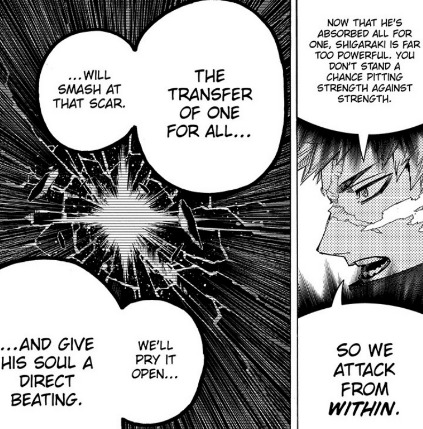
Once he's inside Shigaraki's mind, he doesn't take time to reflect on how Shigaraki used to stand up for bullied kids, or how he wants to be a hero to villains because no one else will stick up for the outcasts in society. No, he only care about Shigaraki when he takes the form of a child crying for help.
In the aftermath of the psychic vision Deku’s behavior doesn’t change towards Shigaraki in any way either. You could say he sacrificed his own arms in order to try to comfort Shigaraki within the depths of his own mind - but that’s not a real sacrifice either because his arms immediately come back. When Judai learns about the sacrifice that Yubel made in a previous life towards him, he stops seeing Yubel as an enemy and finds a way to resolve things peacefully between them. When Deku lanterns that Shigaraki’s a victim of All for One, and that his entire life was a lie, when he sees Shigaraki’s suffering first hand does his beavior twoards Shigaraki change in any way?
When he sees Afo has taken over Shigaraki’s body again, does he try to shout for Shigaraki, to tell Shigaraki to fight from the inside, to reassure Shigaraki that he’s still in there that there’s still good in him? Nope. He just punches Shigaraki some more.
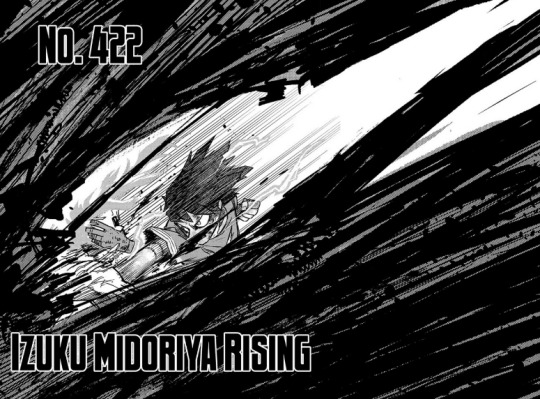
What Deku needed to tell Shigaraki is so obviously set up by the narrative too. Shigaraki wanted just one person in that house to tell him he could be a hero. Deku wanted his mother to tell him he could be a hero if he was quirkless. Deku sees that Shigaraki started out as a boy who wanted to be a hero, and who was manipulated into being a villain but does he try to appeal to the boy inside of Shigaraki by telling him he can still be a hero? Does he now see the good in Shigaraki? Nope, he just tries to kill him by punching him really hard.
I purposefully chose the images for the banner of this post, because it shows how differently MHA and GX treated its villains in the end. Yubel is embraced by Judai in the end, Shigaraki evaporates into dust.
"Judai, now that our souls have become one we will never be separated again. I have now been filled with your love and power. Let us fight together, against the wave of light leading this universe to destruction!"
Shigaraki could so easily have been given the love and empathy that Yubel was shown, but instead their life ends with no show of empathy from Deku, and with them dying believing that their long life of tragedy meant nothing in the end. Shigaraki realizes he's a crying kid, but he's never comforted.
Shigaraki: I only stole my body back from Master, and I didn't destroy anything. "In the end, I was just as you said... A crying kid, huh?"
Yubel is embraced and comforted, Shigaraki disintegrates into nothing.
One of these stories is apparently an optimistic story about heroes saving people, but it ends with the lifelong victim being killed in the most nihilistic manner possible, never receiving comfort, and never achieving anything with his long life.
The other story is a silly anime about card games, shows that when people are alone and suffering they can lash out and do terrible things. That all people are weak especially when they're alone, but the solution isn't to abandon them, or condemn them for their faults, but to believe in them and help uplift them the same way that Judai decides to uplift Yubel so they can atone together.
Which is why Deku gets an F in being a hero. Go directly to summer school. Do not pass Go. Do not collect $100.
#mha meta#ygo meta#mha 423#bnha 423#mha 423 spoilers#bnha 423 spoilers#izuku midoriya#deku#shigaraki tomura#tenko shimura#judai yuki#yubel#soulshipping#yu gi oh gx#yu gi oh
741 notes
·
View notes
Text
GOD BLESS AMERICA AND ALL THE BEAUTIFUL WOMEN IN IT —HUSBAND!JACK SCHLOSSBERG COMFORT HEADCANONS 𓍼 𓇢𓆸

jack schlossberg fan fiction is for the lovers
WIFE!READER returns and is the orion carloto archetype, who balances modelling and writing, and i imagine her making tiktoks in the same vain of alanabananaxox (she's been my no.1 tiktoker since 2021) and sotce on tiktok.
taglist: @candyneckl6ce @rocker-chick-7 @ultr4v1ol3nt @violetharmonsfavgf @strip-weather-forecast @darcyspirits @fortheloveofjos @h-l-v-kennedy-blog @h-l-vlovesvintage @bluelancergirl @snowsgames @salvatoresablondie @dulcegal @kennedyism @bloxholden35 @kimcrystal123 @absurdlyvintage @jackiesgirl @chemicalw0rld @remotewatch @starsprangledgirl
no matter the stressor husband!jack literally treats it as a top-priority emergency
immediately goes to start a bath for you in your gorgeous copper bathtub (cause of course you have a copper bathtub ... duh) with some suzzane kaufman bath salt's that he picked up down in greenwich after a meeting with vogue's magazine department.
husband!jack is a freak for baths and it's rubbed off on you ... seriously like that man takes baths multiple times a week, on top of daily showers
if he had to be out on a day you were particularly anxious for whatever reason he would come home with a laundry bag of new tasteful yet cute stuffed animals from loewe and never tell you the prices cause he knows you'd crash out
is great at being a body pillow and has no shame just laying in silence together for hours
would try to make you feel better by getting the overpriced (not in your opinion) criterion subscription just so you could watch vintage halloween movies without running a risk of getting hacked on some third-party sketchy website
would 100% let you live in his clothes while he was out of the house so you could feel comforted even if he wasn't physically near
would absolutely try to distract you with light comedy, despite his cockiness he is indeed a funny guy so it helps slightly
husband!jack would be such a proponent of a healthy mind is a healthy body so he'd make you go do jump rope with him (cause why does jump roping have to be so humiliating) or even worse takes you out to paddle board, like imagine your knee-deep in that melancholic state where you only read plath novels and listen to unreleased lana and your boyfriend drags you out to go paddle boarding???? like cmon now
you do feel better afterwards but you would never tell him that
if you guys owned any pets together he would without a doubt tell you he's going to be out for a couple of hours and come back with one of those portrait paintings of house-pets to cheer you up (editors note: vang olsen mimi does the most delightful pet paintings if your in greenwich!)
he would absolutely NOT be above trying to self-medicate your problems (within reason) by smoking w*ed with you or sharing a cigar being the chicest couple ever!
would 100% smother you in delightfully soft cashmere blankets in the pattern of gorgeous tapestries
would earnestly read poems (robert frost, emily dickinson, and shakespeare) to you to get you to sleep on the especially hard days
is a devout optimist and routinely talks you out of your doom scrolling
always holds space for whatever emotions you are feeling but always wants to provide solutions to your problems
and when he encounters a problem he can't so easily fix he invests time into getting your mind off it and plans steps you can take to lessen the hold whatever your stressing about has on you
writes mini impromptu love letters/pep talks on the empty spaces in your agenda notebook (wife!reader would totally own more than 1 of these louise carmen organisers in an apropos shade of autumn scarlet )
encourages you to do self-care rituals with your staple skincare products by letting you do the exact same steps on him
while husband!jack cooks for you both you read him your favourite chapters of "democracy" by joan didion in the kitchen every night and it remains a pillar in your routine despite the tumult
during your hard times jack is serving peak husbandry doing the washing, cooking and cleaning
when he's on his lunch break at the office you get text messages like this:


always makes sure that you take your medication (if you take any) at the exact times its supposed to be at and has little alarms on his phone
husband!jack would increase his acts of service to 1000% like that man would be taking your row boots into the cobbler for a new sole
would bring home flowers without a special occasion, just cause
would without a doubt bring out those STELLAR accents just to see you smile
disclaimer: this is all obviously fiction and i do not know this man nor how he calms anyone down, this is all for some fun distraction in these trying times.
to anyone struggling with the results and its ramifications (same here) i would really encourage you to read this beautiful (free) essay from alanabanaxox on patreon: https://www.patreon.com/posts/i-miss-dancing-115580140?utm_medium=clipboard_copy&utm_source=copyLink&utm_campaign=postshare_fan&utm_content=web_share
#jack schlossberg x reader#jack schlossberg fanfiction#jack schlossberg imagines#jack schlossberg fanfic#kennedy fanfiction#kennedy fanfic#x reader#my headcanons#melancholicstation pilled#melancholicstation writes#melancholicstation
220 notes
·
View notes
Text
In addition to the text below (about headcanons Mr Gap). About his name: 隙間の男 - his name in Japanese looks like this.
隙間 (すきま, suki-ma) means "gap" or "space in between."
の (no) – a particle that shows possession or connection.
男 (おとこ, Otoko) – "man or guy" It turns out his name is called Sukima no Otoko, but his friends call him "F#ck off please" :D
And a bit about which yokai archetype he resembles. Overall, he combines the qualities of many yokai really well, making him such a very aesthetic. But I think these two fit perfectly. Then you remembered a book. It had a strange illustration that stuck in your mind: the eye of a creature peeking out from a crack in the wall.
Mokumokuren (目目連): A yokai whose eyes appear in cracks and gaps, symbolizing constant observation. It’s usually neutral, but its presence can feel unsettling. Oh, and he can also take your eyes. Remember the scene where Mr Silvair seals a crack in the wall, and Mr Gap loses the ability to watch through it? That’s a perfect example of how to deal with this kind of yokai. Just fix the damage. Mr Gap’s eyes are huge, and he knows a lot. Who else would dig through the trash to read articles in a magazine? Sorry, I mean to look at pictures, since he doesn’t understand the language :D Anyway, that’s why he’s the one helping us piece together fragments of the MC past.
Jubokko (樹木子): A yokai tree that feeds on human blood to fill. Mr Gap’s requests for body parts hint at his desire to fill something he’s missing. He doesn’t physically have a heart or a body. I like this concept, as it feels melancholic and sad.
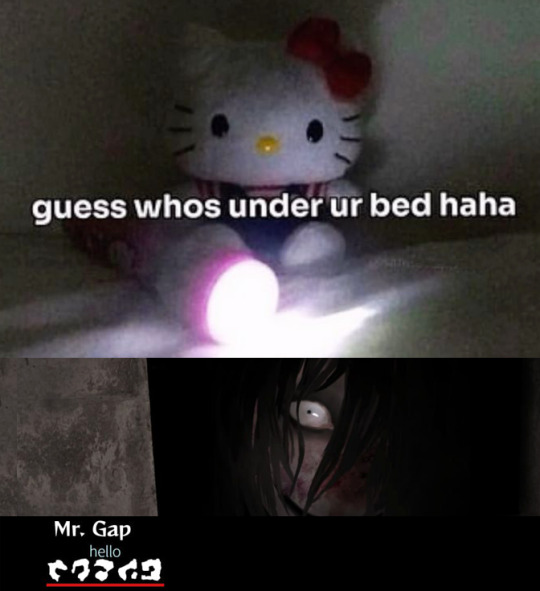
#mr gap#homicipher#文字化化#homicipher spoilers#homicipher x reader#homicipher headcanons#隙間の男#mr gap x you#homicipher fanfiction#mr. gap#homicipher mr gap#homicipher game#horror games
203 notes
·
View notes
Note
Lily doesn’t seem to think she’s done anything wrong by insulting his poverty and aligning herself with his abusers - only Severus is remorseful, and the trauma that caused him to lash out was considerably worse than the trauma that caused her to lash out. She believes he deserves it, as apparently she believed his abuse was amusing. And I’d be totally fine with this from a character perspective because it’s the teenage condition to be self-centred and poor at self-reflection. But the *narrative* (and the author in interviews) doesn’t believe Lily was in the wrong here. And it believes Lily made the correct moral judgment on the two boys when she casts Severus off for his crime and falls in love with James despite his. But I just don’t buy into that framing, and I didn’t even when I was 10. The use of the word ‘mudblood’ while in considerable distress is not a greater sin than sexual assault.
Lily feels no remorse, nor does she think it's wrong to half-smile at the bully who’s targeting your so-called friend. She doesn’t even consider that this might be why your supposed best friend insulted you in the first place. But here’s the thing: this isn't Lily's fault. It's J.K. Rowling's fault, and the way she portrays ethical dilemmas throughout the series, blurring the lines between what's morally right and wrong. Now, if you’ll allow me, before diving into the dynamics between Lily and Severus, I’d like to provide some context as to why I believe the biggest issue with many of the characters’ attitudes in the series lies in Rowling’s constant attempt to project her own moral compass through her writing. In doing so, she falls into repeated inconsistencies and creates a narrative that’s all over the place when it comes to how certain characters are treated.
Rowling is never consistent. She portrays Draco Malfoy as an irredeemable, terrible character because he’s a rich kid spoiled by his parents, using his power and influence to bully those weaker than him. Yet, she gives James the benefit of the doubt, even though he behaved exactly the same way: a rich bully who used his status and his friends to gang up on the vulnerable. From early interviews, Rowling claimed Pansy Parkinson is practically the reincarnation of Satan, even though, of all the antagonists, Pansy is probably one of the least relevant and harmless. This is simply because Rowling projected onto her the stereotypical “mean girls” who mock those who read and study—something Rowling clearly couldn’t stand. On the other hand, she glorifies characters like Ginny, who has a pretty nasty attitude towards any girl she doesn’t consider cool or "not like the other girls." Ginny treats Fleur like a witch when Fleur has done nothing wrong—her only crime is being incredibly beautiful, knowing it, and not constantly apologizing for it. And this treatment of female characters throughout the series deserves a proper gendered critique, because they fall into every stereotype and archetype set by the traditional male gaze.
In Rowling's world, there are always two kinds of women. When it comes to younger, adolescent characters, there are the "good" women—those who don’t fit the typical feminine mold, the weird ones (like Luna), the tomboys who are “one of the guys” (like Ginny), or the overly studious ones who don’t have time for frivolous things like reading magazines or talking about boys (like Hermione). In other words, the cool girls, the ones who are supposed to be role models, are those who "aren’t like the other girls." But not because they’re deconstructing gender roles consciously—they just happen to embody the fantasy of the woman who can give you kids while still being one of your bros. It’s a common male fantasy, where women abandon the graceful, ethereal, delicate image to fit into a set of needs the modern man has. These are "manic pixie dream girls," hiding a deeply internalized misogyny as they are presented as individuals opposed to the “other” women—the “other” being less cool because they lack traditionally masculine traits, and thus are less than. We see this not only with how Fleur is treated but also with the disdain or prejudice Hermione shows towards girls like Lavender or the Patil sisters, just because they act like normal teenagers instead of validating themselves through academia to compensate for their inferiority complex (cough, cough).
Then we have the adult female characters, where Rowling’s toxic and incredibly conservative view of motherhood kicks in. Except for McGonagall, the rest of the adult women who are seen in a positive light are either already mothers or end up becoming mothers. And for them, motherhood is everything. They are mothers first and women second, in every case. Lily is Harry’s mother, who sacrifices herself for him. Molly is the Weasley matriarch, whose entire life revolves around her kids—she hasn’t even looked for a job (which wouldn’t be a bad idea, considering the family’s financial situation), nor does she have any aspirations beyond knitting sweaters and worrying about her children. Even Narcissa, a negative character throughout most of the saga, earns her redemption solely because she loves her son and is willing to risk everything for him. Nymphadora Tonks, a 25-year-old woman, ends up pregnant by a man 13 years older than her and goes from being an independent Auror with her own life to a passive housewife waiting for her man, who is off having an existential crisis. The adult women in the saga aren’t independent individuals—they’re extensions of their children. And any woman who isn’t a perfect, self-sacrificing mother (like Merope Gaunt) is either a psychopath or portrayed as a terrible person.
What I’m getting at is that Rowling is far from impartial in the moral narrative of the story. In fact, she’s absolutely inconsistent. She presents characters she sells as "good," whose attitudes are absolute trash, yet she continues to insist that they’re good and perfect. This is especially obvious with her female characters, because throughout the seven books, she constantly emphasizes her ideal of the "perfect woman" in terms of tastes, motivations, and behavior. Hermione is a self-insert, Ginny is probably a projection of who Rowling wishes she could’ve been, and Luna is the quirky girl who isn’t “threatening” to other women, and is treated with a condescending, paternalistic lens. They are either Rowling’s aspirational figures or archetypes that don’t bother her, or they’re reduced to filler characters who are mistreated by the narrative.
When it comes to Lily, the problem is that Rowling spends half the saga painting her as some kind of Mother Teresa. She’s the quintessence of motherhood—but not a conscious, modern motherhood, but one rooted in traditional Judeo-Christian ideals. This is the kind of motherhood that can do no wrong, the one that represents women because, in this view, a woman can’t be fulfilled unless she’s a mother. Lily dies for her son, and that love creates a divine, protective magic. She’s beautiful, popular, and one of the most popular guys at school is after her. Clearly, she must be a saint, because everyone describes her as such. And while the narrative does question James’s perfection, even if vaguely and unsuccessfully, it doesn’t do the same with Lily. Harry questions his father’s actions but never his mother’s. He never stops to think about how problematic it is that his mother almost laughed at Severus or refused to hear his apology, or that she couldn’t empathize with what he was going through, knowing full well the kind of situation Severus had at home. When a narrative tells you something but never shows it, and worse, never questions it, that’s a problem. Something doesn’t add up. Rowling is obsessed with showing her own moral line through her characters and doesn’t realize how incoherent it is to portray Lily as someone who always does the right thing when what we actually see of her suggests that, if she really liked James all along, not only is she a hypocrite, but she’s also quite superficial with questionable principles. But this is never addressed, never explored. It would be fascinating if it were, giving the character more depth and making her more relatable. But Rowling brushes all this aside, as she does with so many other things, because to her, Lily was a role model, despite the fact that anyone with common sense can see she was just a terrible friend who got tired of justifying why she hung out with a poor, scruffy kid and ultimately decided it made more sense to date the rich, handsome bully.
#harry potter meta#harry potter women#hermione greanger#ginny weasley#lily evans#fleur delacour#lavender brown#parvati patil#narcissa black#molly weasley#luna lovegood#jk rowling#severus snape#pro severus snape#snapedom#james potter#nymphadora tonks#critical view#women portrayals in harry potter kinda sucks#very old fashioned to be hones#zero feminism here
173 notes
·
View notes
Text
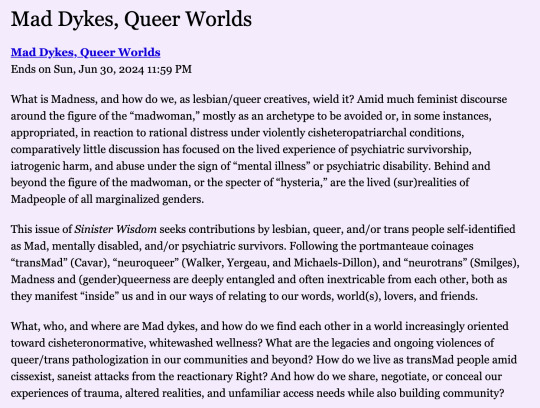
Submissions open through June 30, 2024 - Mad Dykes, Queer Worlds
Hello all! I'm editing a special issue of the literary magazine Sinister Wisdom titled Mad Dykes, Queer Worlds. If you're Mad –– regardless of personal label or diagnostic status –– and identify with some aspect of dyke experience (in all its multiplicities!), I want to consider your work for publication.
The title links to Submittable, the platform Sinister Wisdom (and most other magazines) use to process submissions. It's free to use, but can be inaccessible for visually disabled people. If that's you, email Sinister Wisdom for alternative submission options.
I am particularly interested in reading work by young/new/emerging creatives, survivors of psychiatric/medical incarceration, and/or those living outside the Global North/West. Visual art and written work are all welcome!
Note: Sinister Wisdom can't pay $; they compensate in a year-long print subscription and complementary copies of the journal. If you only submit to magazines that pay, consider checking out mine, manywor(l)ds.place; we reopen for general submissions June 1.
Feel free to email me with any further questions. Don't self-reject. ID for the image both in the alt text and below the cut.
Mad Dykes, Queer Worlds
What is Madness, and how do we, as lesbian/queer creatives, wield it? Amid much feminist discourse around the figure of the “madwoman,” mostly as an archetype to be avoided or, in some instances, appropriated, in reaction to rational distress under violently cisheteropatriarchal conditions, comparatively little discussion has focused on the lived experience of psychiatric survivorship, iatrogenic harm, and abuse under the sign of “mental illness” or psychiatric disability. Behind and beyond the figure of the madwoman, or the specter of “hysteria,” are the lived (sur)realities of Madpeople of all marginalized genders.
This issue of��Sinister Wisdom seeks contributions by lesbian, queer, and/or trans people self-identified as Mad, mentally disabled, and/or psychiatric survivors. Following the portmanteaue coinages “transMad” (Cavar), “neuroqueer” (Walker, Yergeau, and Michaels-Dillon), and “neurotrans” (Smilges), Madness and (gender)queerness are deeply entangled and often inextricable from each other, both as they manifest “inside” us and in our ways of relating to our words, world(s), lovers, and friends.
What, who, and where are Mad dykes, and how do we find each other in a world increasingly oriented toward cisheteronormative, whitewashed wellness? What are the legacies and ongoing violences of queer/trans pathologization in our communities and beyond? How do we live as transMad people amid cissexist, saneist attacks from the reactionary Right? And how do we share, negotiate, or conceal our experiences of trauma, altered realities, and unfamiliar access needs while also building community?
Please submit works of any, all, or no genres, including reviews and interviews, up to 5,000 words, and a short contributor biography between 25 and 125 words. We are also seeking illustrations and photographs (.jpg or .tif files only, print resolution size at least 300 ppi). Please do not send previously published work.
Deadline for submissions: June 30, 2024
-
-
[tagging for spread hopefully! @closet-keys, @rebirthgarments, @fluoresensitive, @heavenlyyshecomes, @trans-axolotl, @fatehbaz @sawasawako @felgueirosa @bioethicists @campgender @candiedsmokedsalmon @sadhoc @osmanthusoolong @boykeats ]
#tia to everyone for sharing!!! i want to get this seen by as many ppl as possible#mine#call for submissions#madness
325 notes
·
View notes
Text
I have a lot of time to kill and noticed that the bridgella shippers deserve some attention, so it's time for my train travelling brain splurge (it will be angsty, I'm warning you now). :)
(TW: mentions of living in a heteronormative society/homophobia/internalised homophobia).
(Glassheart will be mentioned in the end because I want to do a part 2 of this post).
Now, I'm presenting an 80's Celebrity/Performer AU!

Now, I imagine both of the girls got into performing in very different ways.
Bridget came from a very privileged background where she was able to be put in various music/acting/dance lessons at a young age. I'd imagine she started her trajectory into stardom very young, starting with modelling and acting before shifting into music (though I'd assume she'd still have a cover/runway girl reputation which she revisits here and there). Bridget would have started off as a 'girl next door' archetype, but once settling into her music career, she would soon settle into an untouchable, bubbly pop princess persona. An IT girl with a stage name of "The Queen of Hearts."
For Ella, I imagine one of the only belongings that she has from her late mother is a guitar, so she's always made a small effort to learn, though that effort increased exponentially once her dad passed and she was left to live with her step family. On her eighteenth birthday, she's not legally required to be her step-mothers 'problem' anymore, so with her few belongings and her treasured guitar, Ella begins her journey to be a performer. She works her way up to the top with a ferocious determination, going from busking on the streets during day and waiting tables at night to meet ends meet, to performing as Auradon’s break out 'riot grrrl' by doing random gigs and opening acts. And when she finally gets a label to fund her first proper album, she's asked if she'd like to take on a stage name. Then is when she decides to title herself as 'Cinderella' for a final middle finger to the family that rejected her (by making a horrid nickname given to her turn into a marker of her success).
Both Ella and Bridget carry on their own careers aware of each others existence. But they only properly meet once their music labels want them to collaborate on a few songs for their latest albums they're working on.
And since Ella's manager believes she should reach out to a bigger audience and create a more positive public image for herself (after a few disaster interviews), Ella agrees. And when it comes to Bridget's PR team, they're trying to make her shake off her untouchable status, given that it has some negative repercussions (as there's a decent chunk of people out there with the view that Bridget is 'too fake' and that she 'probably let all that fame get to her head'). So Bridget ends up agreeing to the collaboration.
They meet at a recording studio, and their meeting isn't exactly ideal. Bridget is her typical self: bright, bubbly, friendly. But Ella doesn't know that's what Bridget is actually like. She thinks she's just meeting Bridget's celebrity persona that won't be shaken off, and she hates it. So after a few minutes of (attempted) polite conversation, it gets awkward and silent between the two. The vibe doesn't seem to get better when they're trying to write new lyrics and compose together, Bridget and Ella mix as well as oil and water does, and everyone in the studio can see it. So after a failure of a music making month, both their managers put a pause on their albums in order to run a PR plan.
Ella and Bridget are tasked with going completely public with their 'friendship' prior to announcing their collaboration. And hopefully, if the prayers of their managers are answered, they'll finally warm up to each other (which is necessity for future interviews).
They begin with a magazine cover together which creates a whole wave of surprise with both their fanbases (who are as opposite as opposites can be), and from there it's hangouts across A-list places (photographed/filmed by strategically placed paparazzi). And before they know it, Ella and Bridget have made headlines as Auradon's most surprisingly iconic best friends.
Though what's more surprising is that after all this, they are still awkward with each other. Sure, they may be a bit more comfortable, but the improvement is inadequate to what was expected of them. But oh well, what are their managers supposed to do about it? They're going to have to shrug it off and carry on making their albums with forced smiles.
But then, when they're finally left alone in a recording studio is when their bond flourishes. Because, wow, Ella is finally making sense of the fact that the Bridget she met on her first day at the studio was actually the real Bridget. And Bridget is starting to appreciate the complexity of Ella's character, and putting together the puzzle pieces to find out Ella is a really genuine person. A specific type of person that is far and few in Auradon's celebrity scene. The type of person she wants as a friend.
So, they finally ditch the picture perfect scenes they were set up to be in and spend their time together after recording just getting to know each other. As Bridget and Ella instead of The Queen of Hearts and Cinderella. They spend lazy nights in watching bad films, they go out to underground parties, they find a favourite ice cream parlour which they go to every Friday.
They're finally friends. And once their respective albums release, featuring each other (in more songs that was ever expected), they're soaring from the success of the careers.
The next few years are spent in the middle of the spot light. Ella has a much wider fanbase as she appears much more approachable (with the help of Bridget practising interviews with her) and Bridget remains a number one star, helped by the fact people have started to properly relate to her now that she (with the encouragement of Ella) is happy to show some of her more imperfect sides that adds some edge to her pop princess persona.
It's glitz and glam. It's red carpet looks. It's having their posters plastered in every corner. It's living together to set the ideal standard of how life can get if you stick to your closest friends and work hard.
...It's secrets and unspoken truths.
Because after all this time, they're best friends. Of course they are. But throughout the years, there are moments which could indicate different.
They don't talk about it. They really shouldn't. It's always the wrong place. The wrong time. What they have is inherently 'wrong'.
But... Too much is too much, and they have to talk about it. Because Bridget can't stand the multiple occasion's when they're in the safety of their own home, with their lips just about brushing, only for Ella to cast a look of doubt and pull away, pretending nothing happened. Because Ella feels like her heart is being ripped out whenever Bridget is back with her on-again-off-again PR boyfriend, only for Bridget to tearfully confess that nothing feels right when she's with him compared to when she's with Ella (and Ella has to grit her teeth every time, because Bridget's 'boyfriend' is the bassist to a wildly popular punk group, 'Uliana's Crew', and she knows that in the publics eyes, she can't match the debonair charm of James Hook. Even if she can be a better partner to Bridget in so many ways).
Neither of them can stomach another night after award shows, dressed to the nines and drunk on disgustingly expensive champagne, trading touches that are too intimate for 'just friends' and whispering in each others ears in the corner of a room. They can no longer ignore the curious looks they get from the people closest to them when they both release album after album, the songs within so obviously being able to be seen as romantic so long as the listener knows the right context the lyrics are referring to. So long as the listener starts swapping 'he' to 'she' in their head during the song.
The confrontation is full of tears and anguish. Both of them know what they feel but neither fully express it.
Bridget, whilst being privileged in many aspects, comes from background where anything out of the norm is unacceptable (she knows, but never says, that the reason she was supported in her career by her family is due to the fact that they thought it was a passing interest. Something that would leave, but once she took off into stardom, it was too late to take things back). She's been put on a pedestal all her life, and what could other's think (her fans, who she lives and breathes and performs for) if she finally speaks up on the fact that she's never been interested in boys. Even thinking of the fact makes her nauseous, because after so long listening to others, she also feels its wrong, even though it feels the exact opposite.
It kills her inside to know that Auradon would be raving about how much they adore the match between a conventional pop princess and a jaded/edgy artist, so long as said artist was a boy.
And when it comes to Ella. She has built her entire livelihood off of her music. It's the one thing that's kept her going in her roughest moments - she has no clue what meaning she'd find in life if she lost it. Because whilst her fans are more accepting (hell, a large percentage are part of the LGBTQ+ community themselves), she knows that other people won't be. That they'd pull her limb from limb and strip her of her career which she gave everything in her for, as an act for revenge for 'spoiling' the 'perfect' image of Bridget they had in their narrow-minded heads. She hates it. She hates The Queen of Hearts. And she loves Bridget.
In conclusion: Bridget would be okay with being in love with Ella if Ella wasn't a girl, and Ella would be okay with being in love with a girl, if the girl wasn't Bridget.
So, they agree to be friends. Carry on as if the talk never happened. They know their limits with each other (even if they are constantly breaking them). And yes, there are slip ups.
Said slip ups act as the highlight of their lives. Said slip ups will cause their downfall: because on a singular occasion, a picture is taken (it's contents: Ella and Bridget sneaking out of a rehearsal studio late at night, hands interlocked, hair messy, lipstick smudged).
The picture goes viral. Passed around. Talked about. Theorised. Concluded on.
Both Bridget and Ella are sent into a panic. What do they do? It's the early stages of their situation being revealed (and they're already seeing hateful responses), and both silently loathe it. The cherry on top? It's not even based in fact, because neither have allowed themselves to even have each other in anyway that they want. Their appearances that night were purely from a hectic rehearsal.
Their PR teams jump to salvage what they can. And when Ella meets Bridget's fearful eyes, they both know it's the end of them. In the following months, they move into their own separate homes and their contact is fleeting. Eventually, the rumours and hate turn into whispers.
But they will never recover.
They'll never be alone in the same room together, ever again.
In the same year of this scandal, a large announcement of Bridget Hearts and James Hook's engagement will ring through all media outlets. The perfect pair: a sweet pop princess (that has been cherished by the kingdoms since her debut into performance as a child) and Auradon's resident, suave 'bad boy' ready to settle down. They're picture perfect. Ella feels sick (so does Bridget), and she makes sure to cross out a firm rejection on her invite to the wedding.
And Ella forces herself to move on. She finds a calm yet fun actor, Christopher Charming. She decides to try love him. She can love him. She does love him in her own way. It's not as bright and golden as her love is was for Bridget, but it's quiet and safe. And he understands her and keeps all her secrets, and that's all she can ever ask for.
Years go on and they live finding other joys to go off of. Life is hard but not impossible without each other, and they try to be happy for one another. Bridget sends a bouquet of flowers to congratulate Ella's marriage to Charming (as a way to say she's happy for her, because Bridget really really wants Ella happy... And as a way to apologise for the fact she can't be there to attend the ceremony). Ella sends presents for Bridget's final show (Bridget's much too tired to perform for another tour, and if she gave any more of herself to The Queen of Hearts, all she'd be left with is bones) where Bridget announces she will be starting 'Wonderland Records', a music label aiming to help artists from unfortunate backgrounds succeed. Bridget gives a supportive smile from across the room when Ella announces she'll be retiring at her final albums award ceremony.
They go on with life, and after both have stepped away from the spot light, they don't expect to ever encounter one another properly anymore.
And that holds true... Until you put their daughters into the scene. Because despite their warnings, both Red and Chloe have followed in their footsteps to become Auradon's newest stars.
With new trends coming around and an increasing demand to see artists perform everywhere, Red and Chloe often encounter each other, especially at music festivals. And they despise each other (even if they're a fan of each others music). But you know what people say. There's a thin line between love and hate (and that history tends to repeat itself).
The next thing Ella and Bridget know, they're witnessing their daughters slowly fall in love. Unashamedly. In front of the whole world to see.
And this time, it ends well.
And when attending a final festival for the summer to support their daughters, they watch as Red plays a song dedicated to Chloe. They watch as a lovesick Chloe hops onto stage, and kisses a flustered Red in front of thousands of people and camera's. They hear people cheer in support.
Because a queer love story is just as natural as any other. It was a long, long wait for society to be like this. But it finally is. And it is perfect for their daughters, who were born at the right time for their type of love which they show off so loudly and proudly.
Ella and Bridget meet each others eyes from the wings of the stage, waiting for their daughters to meet them on either side. And they give a friendly smile. Because whilst they couldn't give each other what they wanted, they're more than happy to give the world to their daughters.
They'll continue to be friendly to each other, and eventually become casual friends, but never anything more. Not in this lifetime.
-------------------------------
Wow that was fun to write!! Hope you enjoyed reading this!! Phoebe Bridgers 'Moon Song' set the perfect tone for me to write this post, haha. <3333
#the situationship to end all situationships#descendants: the rise of red#bridgella#bridget hearts#ella charming#red x chloe#chloe x red#glassheart#MajorlySapphic'sConcepts
161 notes
·
View notes
Photo
The Most Beautiful Place On Earth
“This is the most beautiful place on earth. There are many such places. Every man, every woman, carries in heart and mind the image of the ideal place, the right place, the one true home, known or unknown, actual or visionary. A houseboat in Kashmir, a view down Atlantic Avenue in Brooklyn, a gray gothic farmhouse two stories high at the end of a red dog road in the Allegheny Mountains, a cabin on the shore of a blue lake in spruce and fir country, a greasy alley near the Hoboken waterfront, or even, possibly, for those of a less demanding sensibility, the world to be seen from a comfortable apartment high in the tender, velvety smog of Manhattan, Chicago, Paris, Tokyo, Rio or Rome - there’s no limit to the human capacity for the homing sentiment.”
Unpublished Letters by Edward Abbey
- Orion magazine

Laurel Avenue, Kane, Pa.
(by DreamingintheDeepSouth)
Together Through Time
Places in the Heart
8 notes
·
View notes
Text
★ Daddy's pornstar ★
Black Mask/Wayne!Reader, 4.8K AN: Based on, (but not 1:1) on this ask! It just activated something in my brain and I had to put it into words. I could kiss you anon! FYI, he's (partly) maskless in this one, just because I felt like shaking things up a bit. Warnings: Roman being absolutely foul, he’s a warning all of his own. Swearing, blackmail, dub-con, insults/name-calling, spit, ass to mouth but barely, spanking, choking, verbal degradation, unprotected sex, manipulation, lying, gratuitous daddy kink. DEAD DOVE: DO NOT EAT. Excerpt: “Don’t look so glum, doll. You’re gorgeous.” Roman's gravelly voice is thick with conceitedness. More than usual. He’s seated just to the side of the camera, smiling at you like he’s the cat and you’re the cream between puffs of a cigarette. His eyes shamelessly rake across your body. “If you ever wanted to get out from your father’s shadow, you could make a killing in the adult industry.” “Please, I don’t want to talk about him right now.” You don’t even want to think about him. Not just because it’s a figurative boner killer, but because he’d be so angry, so disappointed in you and your actions. You stare at the blinking red light of the camera as you try not to recall the destructive series of events that had led you here. The reckless, downright stupid behaviour that had handed Roman the ammunition to bend you to his will. “Alright. I’ll be your daddy tonight.”

Selina had told you once, after helping your father take down an infamous Gotham-based trafficking ring that the little spiel adult actors give at the beginning of pornos was often complete bullshit. When Cherry Rose or Missy Sin said, “I’m of sound body and mind, and I consent to everything I’m about to do.” they were fucking themselves, metaphorically and literally. That as soon as those words were caught on tape, sketchy cast and crews could use it as a free pass to do whatever they wanted to those performers without repercussions.
That fact, while upsetting, hadn’t really solidified in your head until you were staring down the lens of a Panasonic camcorder, barely faking a smile as you made the very same speech, wondering how many pornstars had been blackmailed or otherwise under duress from the start.
“Don’t look so glum, doll. You’re gorgeous.” Roman's gravelly voice is thick with conceitedness. More than usual. He’s seated just to the side of the camera, smiling at you like he’s the cat and you’re the cream between puffs of a cigarette. His eyes shamelessly rake across your body. It’s not clear if he’s appreciative of you in general or of the sheer, feather-hemmed lingerie he’d picked out for you. It’s exactly the kind of thing you’d expect to find on the body of an heiress gone wild in the pages of an 80s Playboy magazine; cute but still a humiliating mockery of the rich kid archetype the media so loves to sexualise. From the shade of pink that compliments your skin tone perfectly, to the way it tastefully clashes with the bedspread, you're pretty certain Roman has put a lot of thought and planning into this whole production. “If you ever wanted to get out from your father’s shadow, you could make a killing in the adult industry.”
“Please, I don’t want to talk about him right now.” You don’t even want to think about him. Not just because it’s a figurative boner killer, but because he’d be so angry, so disappointed in you and your actions. You stare at the blinking red light of the camera as you try not to recall the destructive series of events that had led you here. The reckless, downright stupid behaviour that had handed Roman the ammunition to bend you to his will.
“Alright.” His smile twists then, into something wicked and you will the heat growing in your stomach to cool. “I’ll be your daddy tonight.”
The suggestion simultaneously makes your skin crawl, and your hair stand on edge. You fight the lurch in your chest by scrunching up your face and glowering at his mask on the bedside table. It’s easier to be repelled by him when he’s Black Mask. He’s not really a person, he’s a symbol, a deity to all that’s wrong with Gotham and its seedy underworld. He laughs aloud, low and throaty, clearly enjoying your visible discomfort. God, you hate him. You hate his laugh. You hate his olive skin. His empty black eyes, his salt and pepper hair, the way he smells so good like sugar and spice and smoke. You hate the way he commands a room simply by being in it. But apparently not all of your body had gotten the memo.
“Agreed?” He says sarcastically, the implication that you don’t really get a choice hangs thick in the air and you nod in reply until he fakes a cough to draw your attention back to him. “Out loud, for the camera.”
“Yes…” He quirks a brow at you, eyes fixated on the shake of your breasts as you attempt to steady your breathing. The name feels wrong on your lips, you haven’t even called your own father Daddy since you were a little girl, but you manage to bite it out. “Daddy.”
“Good girl.” It shouldn’t, but the way he drawls the pet-name makes you feel flushed. “Well, what are you waiting for? We’re rolling.”
For the first time since you’d met him here, you look at him dead on, staring dumbly, hoping for at least a little direction. You’d never done this sort of thing before; you didn’t know where to begin. And you certainly didn’t want to perform so badly that he made it an excuse to have you do it all over again. He stares back at you, head tilted, eyes wide and hungry, watching you expectantly.
“Touch yourself.” He clarifies impatiently. “Play with your tits, finger you pussy, whatever you do when you’re lying in bed alone at night, wishing somebody would fuck you the way you need.”
But you don’t want to be fucked, at least that’s the story you’re feeding yourself. You half gesture to your nether regions as you whisper. “But I’m not wet yet.”
“It’s a good thing you’re pretty, cause you’re not very bright, are you?” He states sharply, straightening his posture and biting his tongue in annoyance as he stubs out his cigarette in a nearby ashtray. His patronising should piss you off, but instead you’re embarrassed. You wish you’d had something to drink before coming here. At least then you could blame your simmering arousal for his mistreatment of you on being tipsy. “Come here.”
He grabs onto your wrist, standing to tower over you as his gloved hands tug you across the bed. Much to your shock, he spit down onto your open palm, amusement palpable as he watches your shocked face.
“What’s the matter? Think you’re too good for my spit?”
“No.” You do. You are. However, ‘no’ instinctively felt like the right thing to say.
“No? Good.” The grin on Roman’s face is pure malice, it makes your heart drop and your knees weak. “Open your mouth for me.”
When you take too long prying your dried lips apart, Roman releases your wrists in favour of gripping the back of your head, yanking you back until your mouth falls open to cry out in pain. Before you know it’s happening you feel a glob of spit hit your tongue, and suddenly your bodies desire for him finally wins. You don’t need lube anymore, your folds growing slicker with each second sat under his burning gaze. The shame of knowing he caught it all up close and personal on film only fuelling the fire in your belly. Your whole body practically boils at your indigent actions as you close your mouth and swallow.
“Very good girl.” Roman offers his approval as he releases you, falling back to his position beside the camera.
“Thank you, Daddy.” You’re not sure where the sudden bravery comes from, but you reply cutely as you lay back on the bed once more, spreading your legs and showing the camera how your newfound wetness has started to seep through the delicate fabric.
“Beautiful.” Roman coos, and it’s the most genuine sounding thing he’s ever said to you. The confusing mix of pride and self-loathing has you grunting in annoyance as you push your fingers under your waist band and begin to run your fingers between your folds, collecting moisture from your leaking entrance and rubbing it against your sensitive clit.
You’ve masturbated many times before, but you’ve never been able to cum from your own hands alone. Now seems a bad time to bring this up, so you channel all your energy into it, building as much friction as you can with your hands and focusing your mind on how good you feel right now. Multiple times Roman has to whistle at you, drawing your attention away from the ceiling and back to the camera as you attempt to force your climax. Each time he looks less entertained by your wandering eyes, until eventually you look over at him only to be greeted by the sight of his penis. Immediately you look away once more, gawking down the lens of the camera, no doubt looking flustered and debauched.
“It’s okay baby, you can look at it.” It’s not really a suggestion, so much as an order. Even when he’s speaking softly, he sounds dangerous, so you angle your head to the side. Watching as he idly pumps away, matching your own strokes with a now ungloved hand. “Like what you see?”
A part of you had been hoping it would be smaller, uglier, something to turn your nose up at, but by all accounts, Roman Sionis has a fucking beautiful cock. Something else you could hate him for. It’s straight, cut, a few shades darker than the rest of his skin, and just big enough to stretch you out in all the right places if you sunk low enough to let him fuck you. A thought that’s becoming more and more appealing with every brush to you heated core.
“Yes.” You strain to form words, joints twitching as you continue to play with your oversensitive, under-climaxed cunt. “Your dick is… nice.”
He chuckles at you, again. While admittedly it was not a good word choice, his constant amusement really makes it difficult to ignore the fact that this is all fun and games to him. You’re a joke, a pawn in his agenda. Damn if the sight of him, leaning back, nonchalantly jerking off over your display doesn’t make your toes curl. But it’s still not enough.
“If you hurry up and cream those pretty panties, I‘ll let you play with it.” You surprise him, and yourself by dramatically kicking your feet against the mattress.
“I can’t!” It comes out petulant and needy. “I’m sorry, I can’t. I’ve never been able to do it myself.”
His eyes narrow, head rolling from side to side as he processes your predicament and considers his next move.
“Sit up and look into the camera.” He eventually instructs, standing up himself to get a good look at you through the viewfinder. “Ask daddy real nicely to help you cum, and I might fuck you with my fingers.”
You can feel his eyes glowering into you through the camera as you hesitate. Deliberating whether you’re really going to beg Black Mask to get you off as you follow his command. The moment your fingers seize movement you feel lost. Yes. If it’s the only way to sooth your desires, then yes, you’re going to swallow your pride and beg him.
“Please daddy.” His eyes don’t leave the screen as he bites down on the tip of his remaining glove to remove it, nor when he loosens his tie and undoes the top button of his shirt. “I need you, please make me cum.”
“I think you can do better.” His hard-on would disagree, but you’re in no position to point that out. “Roll over, put your ass up for the camera and keep begging for me baby.”
Somehow, having your entire sex front and centre for the camera, hardly concealed by your see-through panties feels a thousand times more exposing than anything you’ve done do far.
“Please.” Your voice grows smaller, but Roman is having none of it.
“Louder.”
“Please fill me with your finger, Daddy.” You start again, willing yourself to speak as loudly as possible. Calling him daddy feels less and less forced each time it rolls off your tongue. “Please, please, please. I’ll do anything.”
Even in your current state, the irony of your last statement isn’t lost on you. Regardless, it has the desired effect. You wait with bated breath, listening to each footfall as Roman deliberately drags his feet across the carpet until he’s stood behind you, completely out of the cameras view you presume but for his hands which come up to cup your ass. You can’t help but moan as he digs his nails into the fat of your cheeks and makes of show of jiggling them.
“Barely even touched you and you’re already cryin’ out like you’re in heat.” He comments, smug as he hooks his fingers in your underwear and works them down your thighs. He teases you by running his pointer finger lightly across your slit, void of any pressure, before delivering an unexpected slap to your cheek. Your legs flinch, another pathetic whine escaping you in reaction, but ultimately it only adds to your pent-up frustration. Only makes you want him more. “You act so prim and proper, but I always knew what you were.”
“What- ” Your question is silenced as Roman finally sinks two fingers between your pussylips, lazily brushing them against your clit in circular motions. It already feels so much better than you’d accomplished alone. You’re so caught up in the feeling that you no longer care about your rapidly deteriorating dignity when he uses his thumbs to pull apart your lips, showing off your dripping entrance, wolf-whistling as he gives the camera the money shot.
“So fuckin’ wet.” Despite his statement, Roman hawks another bead of spit onto it before sliding two more fingers in without resistance. “D’you know what this is?”
“It’s my pussy, daddy.” You answer earnestly, eyes rolling back at the feel of him plunging inside you.
“That’s right baby.” He purrs. “Your pussy. The pussy of a cock hungry slut.”
“Or maybe it’s mine.” He continues, unapologetically shoving his long fingers in and out of your cunt at a demanding pace. All the while his other hand strokes your clit. The wet squelch that emanates with every touch makes you feel so lewd. You squeeze your eyes shut, holding back hot tears of humiliation and desperation as Roman easily brings you closer and closer to the edge. “Maybe I’ll claim it. Maybe I’ll put my nice dick in there and pump you full of daddy’s cum.”
“Fuck!” You can’t think straight, the only thing on your mind is how fucking good this feels. How much better it would feel to have Roman’s cock pulsing inside you. A damp slapping sound begins to ring throughout the room. You realise quickly that it’s your slit, smacking against Romans hands as you subconsciously rock back onto them, matching his rhythm.
“Is that what you want baby? D’you want to give daddy your pussy?” He growls, perfectly in time with the eruption of your orgasm.
“Yes, it’s your pussy, Daddy. Take it, take my pussy.” The words roll off your tongue completely uninhibited. You’ve no capacity to censor yourself, to think for yourself as shockwaves roll through every vein and nerve of your body. “I want your cock, Roman. I want your cum. Please ruin me.”
Roman lets you ride it out, holding still while you grind against him until you come to a complete stop, quietly panting into the comforter until he’s satisfied that you’re done. Then before you know what’s happening, he rips his hands back and delivers a series of rapid strikes to your ass. Harder than the previous one, sure to leave a mark.
“What’s. My. Name. Bitch?” He bites between each hit. “Whose. Your. Fuckin’. Daddy?”
The sudden change in pace has you reeling and scrambling to pull away, but Roman follows until you surrender. “Daddy! You’re my daddy!”
“And don’t you fuckin forget it.” It’s absolutely an order, bitter and laced with scathing levels supressed rage. A reminder of who he is and that he’s calling the shots right now. “Get up here.”
As soon as you’re in range to be gripped without roaming too far into frame, Roman locks his hands around you, manhandling you until your back is to his chest. His hand is around your throat, squeezing just tight enough to restrict but not stop your breathing as he threads a finger between your ass cheeks, poking at the rim of your hole. For a second, he cinches his grip on your neck, causing another tear to roll down your face, adding another streak of mascara to the dried marks from your finger fucking.
“Call my name one more time baby, and I won’t just ruin your pussy.” To emphasis his point, he bullies the tip of his finger inside, grinning when you whinge at the dry, hot pain. “And trust me, no amount of spit is gonna help you then. Got it?”
“Yes, Daddy. I’m sorry.” He pulls his fingers back from your ass, your sigh of relief cut off by his stiffening grip on your windpipe once more. Instead, you let out a pathetic mix of sputtering and moaning. You deliberately try to stay limp for him, obedient, but when he brings the fingers he’d been fucking you with to your mouth your muscles automatically tense. His warm digits pass your lips, and he brushes his musty fingers on your tongue, forcing you to taste the bittersweetness of both holes. You instinctively try to protest but all that comes out again is weak gasp and strings of drool.
“You like how you taste?” He mocks. “Like being choked?”
If you say yes, he might do it more. If you say no, he’ll definitely do it more, so you hedge your bets and nod for him, coughing out a sad little “yes” around his finger.
“Fuckin’ whore.” That infuriating laugh, again. This time more to himself than to you as he releases your neck and steps away from the bed. He surveys you for a moment, examining your position on the bed as you gasp for air before grabbing the tripod and moving it further down the bed.
“Get on your hands and knee, facing the camera this time.” Once you’ve caught your breath, you reposition yourself as instructed. Weary eyes watching as Roman retrieves his mask from the nightstand. The cosmetic red eyes stare you down as he crosses the room to stand behind you. The bed dips under his weight and your hazy brain finally clicks why he’d been so pissed at you for using his name. It’s not just a humiliation thing. He intended from the beginning to remain anonymous, even if the video was solely for himself. Everybody knew Roman was Black Mask, but nobody could irrefutably prove it, a technicality that kept him out of prison.
The train of thought however is lost when Roman barks out his next instruction. “Take the bra off.”
You're way passed modesty at this point. Frankly, you're relieved to be rid of the plasticky faux feathers digging into your cleavage.
If your bare and open core had been the money shot, this would be the clickbait. A Wayne Scion stripped naked and practically presenting herself for one of Gotham's most notorious crime lords. Sure, nobody could confirm it was him, but between the voice, the suit, and the mask, it was obvious.
You’re grateful when Roman doesn’t spend much time admiring or groping at your breasts, but that gratitude is quickly swallowed by torment when he starts repeatedly thrusts his shaft into your slit, denying your cunt in favour of teasing your clit. The sensation causes you to clench around nothing. Having barely come down from your previous orgasm, your body greedily wants more.
“You should know by now what I want to hear.” Roman croons, securing a hand on your waist to keep you still as he drags the tip of his cock between your folds. He wants you to plead, and at this point you'd do anything to finally feel him inside you. “Don’t make me ask you for it.”
“Please, Daddy.” Clearly also feeling eager, Roman is quick to line himself up with your entrance, pushing in just deep enough to part your labia, but withholding any satisfaction. You let out a salacious moan, nonetheless. “Please fuck my cock hungry pussy!”
“Oh, I’m not just gonna fuck it, baby.” His cock plunges into you without resistance. He’s not overtly thick, but your walls immediately start spasming and stretching around him, hugging him tightly in all the right places. Mouth and pussy drooling for him in an instant as he begins ramming in and out of you, allowing you no time to adjust. It hurts like hell for a few moments, but the pain is so worth the pleasure. “I’m gonna ruin it. That’s what you wanted, right? Want me to pound this filthy fuckin’ cunt like nobody else ever has. You're not gonna want anyone else by the time I’m done with you.”
Every nasty word out of his mouth feels like a threat, it only adds to the sex drunk haze that fogs your mind, and he just keeps snarling. For the first time in your tenuous relationship, you hope he never shuts the fuck up.
“You fuckin’ love it.” He snaps, gripping the back of your neck to keep your head up, all the while slamming into you at a painful pace, knocking the wind out of you as you sob for the camera. “Say it. Say you fucking love being a helpless whore, split open on Daddy dick.”
Any words out of your mouth at this point are completely unintelligible at best. Broken, feeble cries at worst. You’re not even sure what you’re trying to say. Eventually you manage to muster a small “Please… please I want…”, relying on Roman’s strength as you reach for your clit. You’re so damn close, you just need that little push. “Want to cum.”
To his credit, Roman knows exactly what you’re asking for, batting your uselessly pawing hands out of the way so he can rub at your tender bud in short teasing motions, making you arch your back into him.
“You’ll cum when I cum.”
“C-cum in me.” Once again, your voice is barely a whisper, strangled by your tensing muscles, shaken with every snap of Romans hips as you selfishly beg for his release so that he’ll give you your own. “Fill my whore pussy, please, daddy.”
Sick, loud, slapping echoes through the room as Roman hammers into you, using your body to chase his orgasm in bruising, frenzied strokes. His body shudders, breath growing hoarse as he finds it. The combined feel of fingers kneading your clit, and the heat of his seed releasing inside your guts has you tumbling straight after him.
“Take it.” The command isn’t necessary, your walls are milking him for all he’s got as your body trembles beneath him, ecstasy making every aching bone feel like putty as he ladens your sex with his seed. He just loves the sound of his own voice. “Take all of it you greedy little bitch.”
Roman’s breathing is erratic. He stays put, dick growing soft inside you for a long time as he steadies himself. As your high begins to falter you start to process the reality of what you’ve just done. Fortunately, you can find solace in the fact that it’s over.
To nobodies’ surprise, Roman is the first to talk. Finding his voice again as he finally pulls out of you.
“I was serious you know.” A chill runs along your back as he skims a finger between your swollen folds, collecting the excess of his cum. “I've got some live-in cam models over in Tail’s End. You’ve got the potential to make it big, doll.”
“No thanks.” Despite your deadpan, when he guilds your weak body up and shoves his sticky fingers in your face, you open wide, unashamedly cleaning every speck until he retracts them. You watch as he holds them up to the light, inspecting your work. Face now hidden behind his fearsome mask, you’ve no idea what he might be thinking which is probably his intent.
“Suit yourself.” He shrugs, your body falling forward at the sudden weight displacement as he stands. Your legs are still like jelly, so you resolve not to move until they’re steady or he’s gone. Which ever happens first.
“I gotta head out in a minute, you know your way to the door, right?” You only nod. Quickly coming down from your post-orgasm high whilst you watch Roman making himself presentable again. Well, mostly presentable. He re-buttons his shirt, straightens his tie, and redons his gloves. There is however a wet patch on his crotch, cause by you no doubt. Dependant on where he’s going, you wouldn’t put it past him to leave it on display so he can brag about his latest lay. “Oh, some of Penguins boys are trying to move in on The Basin. Be careful if you're passing that way.”
“Why?” He got what he wanted from you. What should he care what happens to you know? Tim is currently building a case on Cobblepot. So, the only part of that statement you care about is how you’re going to feed that intel to him without revealing your source.
“I don’t want that creature puttin’ his hand on what’s mine.” What’s his? He says it so factually it’s almost laughable. Sure, he’d been a good fuck, but that wasn’t enough to keep you coming back to him. Cocky bastard.
Despite your derision, you nod, humouring him. The sooner he leaves, the better. Then you’ll rarely have to see him again. “Right.”
“Don’t clean up.” He rattles off another demands, now focused on the camera. His hands work quickly, turning it off and ejecting the memory card so fast it must be muscle memory. He’s done this sort of thing before. How many others had he extorted like this? When the memory card is tucked safely away in his wallet, Roman scoops the discarded panties from the floor, pressing them to his wooden nose and sniffing before tossing them over to you. “Put those back on. I want you to stink of your own arousal all the way home. Want you to feel all that cum inside you and know who put it there.”
You can’t hold your contempt back any longer at this point. Glaring, you scoff at him. “I’ll pass.”
“I don't think you understand the nature of our arrangement.” He snarls back. You were so close to being rid of him but now he’s doubling back to you. The permanent leer of his masks red eyes staring you down as he leans close to your supine form. “You don't get to pass.”
“My debt to you is paid.” You spit. When you make to sit up his gloved hand latches onto your jaw, muffling your speech as you try to argue with him. “Tonight was me getting straight with you.”
“Thats right.” His faux-soft tone contrasts with the demeaning drip of spit he aims onto your cheek. In retaliation you attempt to pull away, digging your nails into the thick fabric of his suit jacket to no avail. “I’ll make sure nobody in Gotham, especially that bitchboy father of yours ever finds out about your little incident.”
Rubbing in his control over you, Roman begins massaging his saliva into your skin. Seemingly trying to clean up your smudged make-up, no doubt purposefully smearing it further around your face.
“But unless you want the contents of our little home video on the homepage of every tabloid and gossip site in the country, you'll keep doing as I say.”
The reality of the situation kicks in, and suddenly you do feel like a little girl. Roman Sionis had tricked you, he’s never intended to make things even. From the moment he’d ‘requested’ a meeting, he’d been planning on keeping you under his thumb and like the naïve child you were, and you’d fell for it, every step of the way.
“You promised nobody would ever see it.” Your voice is small and pitiful, even to you. No doubt Roman is grinning like a fat-cat beneath his veneer.
“And if you make a liar out of me, neither of us is going to be happy.” You’re not proud of the tears the follow, releasing Roman’s arm in favour of dabbing at your eyes. Breathing deeply, you try to stop from blubbering. You’re so angry, but you don’t have the energy to fight. “Now you're getting it.”
You sit stiffly as Roman’s leather clad hand wander your face. Patting and pinching your cheeks in mock affection.
“This is a cute look. Bet your brother's fawn all over it. Personally, I just wanna stick my dick between those pouty lips.” His words sting, they make your stomach nauseous. Your brothers would fly of the handle if they could see you know. Jason in particular would probably be more pissed than your father.
Eventually Roman releases you, and you hastily stand to start redressing yourself, but as you do his cum begins to trickle out from your still gaping cunt, and you almost retch at the feeling.
“This must be hard for you. Tell you what, why don't you stay here? Avoid the family until you've come to terms.” Continuing to parody genuine tenderness, Roman catches your wavering body and brings you close, gently wrapping you up in his arms. You can’t deny it feels nice, his warmth, his smell. Your fickle centre betrays you, growing wet once more, even as the rest of your body wants to curl up and die from your foolishness. “I've got some business to attend to, but I’ll be back in a few hours. Get some rest, and when you're good and ready we’ll test how much of daddy’s cock you can take down your throat before you start choking?”
#dc#black mask#roman sionis#gilverrwrites#roman sionis/reader#roman sionis smut#roman sionis x reader#black mask smut#black mask x reader#black mask/reader#nsft#f reader#dead dove do not eat#divider by @anitalenia#wayne reader
61 notes
·
View notes
Text
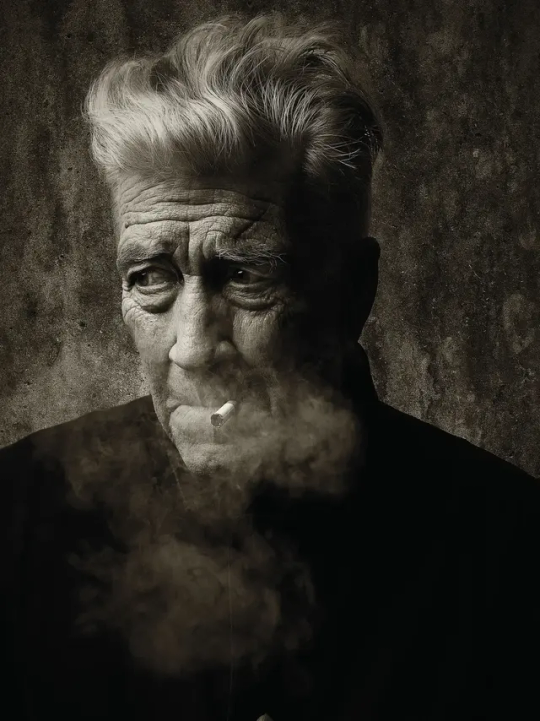
David Lynch
US director whose wildly unconventional films burrowed into the unsavoury depths of his nation’s psyche
David Lynch, who has died aged 78, was the most original film-maker to emerge in postwar America, as well as the greatest cinematic surrealist since Buñuel. His understanding of desire, fantasy and dread was unparalleled; the Paris Review called him “the Edward Hopper of American film”.
He made his debut with the experimental Eraserhead (1977), shot in sooty black-and-white and set in a churning industrial landscape where a man with a tombstone-shaped pompadour tends to his mewling, reptilian baby. From the first frames, Lynch mapped out a cinema of the subconscious that thrived on its own dream logic and nightmare imagery. It shaped everything he did, including his masterpiece Blue Velvet (1986), in which an innocent young man (Kyle MacLachlan) discovers a human ear and is drawn into the sleazy, violent world of a psychopath (Dennis Hopper) and a terrorised torch singer (Isabella Rossellini).
That film introduced into the archetype of cosy small-town America some potent notes of scepticism and revulsion that have never been dispelled.
This project to burrow into the unsavoury depths of his country’s psyche continued with the television whodunnit Twin Peaks, co-created with Mark Frost, which ran for two series in 1990 and 1991 then spawned a big-screen prequel, Twin Peaks: Fire Walk With Me (1992). The show returned 25 years later in a bold but often harrowing and impenetrable third series that, despite being made for TV, was voted the best film of 2017 by Cahiers du Cinéma and Sight & Sound magazines. To preserve the spell cast by his work, Lynch refused to be drawn on explanations. Asked what the third helping of Twin Peaks was about, he replied: “It’s about 18 hours.”
He exposed the horrors lurking beneath apparently placid exteriors, and found beauty in the quotidian, the industrial – “I’d rather go to a factory any day than walk in the woods” – or the repellent: “If you don’t know what it is, a sore can be very beautiful.” For all the darkness of Lynch’s vision, his films could also be extremely funny, peppered with verbal and visual non sequiturs, skew-whiff line readings, slapstick violence and comic embarrassment. The mix of folksy naivety and elusive strangeness in his work extended to his persona and even his wardrobe: 1950s-style slacks and blazer, and a shirt buttoned to the gullet.
He drank a milkshake in the same diner (Bob’s Big Boy) every day for seven years between the late-70s and mid-80s. Watching him on set, the novelist David Foster Wallace observed: “It’s hard to tell if he’s a genius or an idiot.” The musician Sting, who starred in his science-fiction adventure Dune (1984), called him “a madman in sheep’s clothing” while Mel Brooks, who produced Lynch’s second film, The Elephant Man (1980), described the affable director as “Jimmy Stewart from Mars”.
Though his films were wildly unconventional, Lynch was still nominated three times for the best director Oscar. (He won an honorary Oscar in 2019.) Wild at Heart (1990), a road movie marked by baroque violence and homages to The Wizard of Oz, won him the Palme d’Or at Cannes, and he was named best director by the same festival in 2001 for Mulholland Drive, a warped neo-noir thriller about an aspiring actor (Naomi Watts) whose dreams of stardom disintegrate horribly after she befriends the amnesiac survivor of a car accident (Laura Harring). Developed by Lynch from his own butchered TV pilot for a series rejected by the ABC network, Mulholland Drive was one of his most seductively strange pictures.
But linear narrative was not beyond him, as he proved with two deeply moving films based on real events: The Elephant Man, about the severely deformed Joseph Merrick (“John” in the screenplay) paraded as a circus freak in the Victorian era, and The Straight Story (1999), in which an elderly man travels 300 miles on a riding mower to see his ailing brother. Both earned Oscar nominations for their lead performers (John Hurt and Richard Farnsworth respectively), which served as a reminder that Lynch���s skill as a director of actors could sometimes be obscured by his extraordinary imaginative powers.
He was born in Missoula, Montana, to Edwina (nee Sundholm), known as Sunny, who occasionally taught English, and Donald Lynch, whose job as a research scientist for the US government’s Department of Agriculture dictated the family’s peripatetic lifestyle. When Lynch was two months old they uprooted to Sandpoint, Idaho, and by the time he was 14 they had moved a further four times.
He described himself as a “troubled” child who was quick to intuit that all was not well. “I learned that just beneath the surface there’s another world, and still different worlds as you dig deeper. I knew it as a kid, but I couldn’t find the proof. It was just a feeling. There is goodness in blue skies and flowers, but another force – a wild pain and decay – also accompanies everything.” The aftertaste of that memory can be found throughout Lynch’s work but particularly in the opening of Blue Velvet, where a montage showing schoolchildren, roses and white picket fences gives way to shots of insects thrashing in the undergrowth.
Having shown an aptitude for painting since adolescence, Lynch began studying art at the age of 18 at the Boston Museum School, then dropped out after a year to travel to Europe with his friend (and future production designer) Jack Fisk, only to return to the US a fortnight later. He got on better at the Pennsylvania Academy of Fine Arts, Philadelphia, where his canvases took a darker turn (one work, The Bride, showed a woman performing an abortion on herself). It was there that Lynch met Peggy Lentz, a fellow student, who in 1967 became the first of his four wives. Together they had a child, Jennifer, and there have been almost as many attempts to link the pressures of youthful parenthood to the plot of Eraserhead as there have been theories about what exactly that film means, with its flying sperm-like creatures, roast chickens that writhe when sliced, and a balloon-cheeked chanteuse who lives behind the radiator.
He had his first solo exhibition in 1967, the same year he made his debut film work, the one-minute loop Six Men Getting Sick. He received a grant from the American Film Institute to make his 34-minute 16mm featurette The Grandmother (1970), in which a neglected child grows an elderly companion from a seed. The film combined jerky stop-motion animation with live-action footage, and showcased the sound design work of the great Alan Splet. Along with Fisk and the composer Angelo Badalamenti, Splet would become one of Lynch’s most vital collaborators.
In 1972, Lynch began work on Eraserhead. The shoot lasted five years, with regular pauses whenever the production ran out of money; Lynch would then supplement the budget with cash from family and friends (Fisk and his wife, the actor Sissy Spacek, were among those who donated) and by working odd jobs, including a paper round. After his marriage broke down, he also slept in the stables where the film was being shot. When it was finally released, Eraserhead was received with bafflement in many quarters, and with a slow-dawning fanaticism by those who caught it in the midnight movie slots at cinemas in the US, where it played, in some cases, for several years consecutively.
The film attracted the admiration of the poet Charles Bukowski and the musician Tom Waits, and went on to influence film-makers including Terry Gilliam and Darren Aronofsky, the Coen brothers and Stanley Kubrick, who reportedly screened it to the cast and crew of The Shining to put them in the appropriate mood.
During the early stages of production on The Elephant Man, Lynch’s attempts to design the complicated makeup failed catastrophically. But the finished film, with makeup by Christopher Tucker, a clammy feel for Victorian England and some unmistakable Lynchian touches (such as the main character’s birth in a giant ball of smoke), was an outstanding success. It melded the director’s sensibility with compassionate, classical storytelling, even if it did play fast and loose with the facts (the real Merrick, for instance, took a healthy cut of profits from being exhibited).
Lynch’s next project, an adaptation of Frank Herbert’s sprawling space epic Dune, was the only one of his films to escape his control entirely, and to be released in a form not approved by him. He was unsuited to the rigours of blockbuster film-making, and his attempts to wrestle Herbert’s many-tentacled narrative into coherent shape were doomed. The film was an expensive flop – Lynch called it “a fiasco” – but it still contained astonishing sets, costumes and sound design. And it introduced Lynch to MacLachlan, who played the bland hero and would become the director’s on-screen alter ego, the Mastroianni to his Fellini, in Blue Velvet and Twin Peaks. In the latter, MacLachlan played the coffee-and-cherry-pie-loving FBI agent Dale Cooper, whose dreams guide his detective work as strongly as any physical clues.
The experience of making Dune left Lynch drained and depressed. “I was almost dead,” he said. “Dune took me off at the knees. Maybe a little higher.” He amused himself by contributing a four-panel comic strip, The Angriest Dog in the World, to the LA Reader newspaper; it ran for nine years, during which time his drawings of a dog chained in a yard remained unaltered and only the text in the speech bubbles changed.
His fortunes were revived, along with his right to final cut, with the sumptuous and terrifying Blue Velvet, a project he had been planning since before Dune. The novelist JG Ballard called it “the best film of the 1980s – surreal, voyeuristic, subversive”.
Wild at Heart could only look frivolous by comparison, despite game performances by Nicolas Cage and Laura Dern as the lovers on the run. But Lynch was back at the height of his powers with the first series of Twin Peaks, which began with the discovery of Laura Palmer (Sheryl Lee) washed up dead and wrapped in plastic. It altered television irrevocably, paving the way for shows such as The X-Files and Lost, True Detective and The Killing; David Chase also cited it as an influence on The Sopranos.
That enthusiastic reception made it all the more bruising for Lynch when Twin Peaks: Fire Walk With Me was widely panned. In its focus on the days leading up to Laura Palmer’s murder, the film sacrificed the quirkiness of the series in favour of an intense mood of violence and suffering, and it was several years before the picture was reappraised more positively.
Lynch’s next film, Lost Highway (1996), was a profoundly unsettling thriller that hinged on an audacious narrative fracture: one moment a jazz saxophonist suspected of murder is sitting in his prison cell; the next he has vanished and the guards find in his place a young mechanic who has no idea how he got there. The film was steeped in deadpan humour and violent imagery (there is a memorable death-by-coffee-table), as well as nausea-inducing high-speed driving footage that would be subverted comically in his next movie, The Straight Story, which never exceeded 4mph.
Acclaim for The Straight Story and Mulholland Drive restored Lynch to his late-80s standing – the latter went on to be voted the best film of the century so far in a poll of critics conducted by the BBC in 2017. His last film, Inland Empire (2006), was concerned, like Mulholland Drive, with an actor (Dern) suffering a breakdown. But at three-hours-plus and with an unusually ugly visual style (it was shot by Lynch on a handheld Sony digital camera), as well as a meandering narrative interrupted occasionally by a rabbit sitcom complete with laugh-track, it offered little of the compensatory seductiveness of the director’s other films.
That said, Lynch was not alone in feeling that Dern deserved an Oscar nomination, even if his decision to express this view by sitting on a Hollywood street corner with a cow and a poster of the actor’s face was more unorthodox than the usual method of taking out a full-page ad in the trade papers.
With the exception of the third series of Twin Peaks, Lynch devoted the rest of his days to painting, music and writing, while resisting suggestions that he had retired from film-making: “I did not say I quit cinema. Simply that nobody knows what the future holds.” Among the albums he released was the avant-garde blues collection Crazy Clown Time (2011). He also worked with the journalist Kristine McKenna on the memoir Room to Dream (2018), in which her biographical chapters about him alternate with ones in which he muses on what she has written and adds his own reflections, and gave an uncanny performance as the eye-patch-wearing, cigar-smoking film-maker John Ford in the final scene of Steven Spielberg’s autobiographical coming-of-age drama The Fabelmans (2022). Though initially reluctant to take the role, he was persuaded by Dern and by Spielberg’s assurance that there would be a large bag of Cheetos waiting in his dressing room. “Any chance I can, I get them,” Lynch said.
He was a passionate advocate of transcendental meditation, writing and speaking at length on the ways in which it had helped his work and enabled him to “catch fish” – his favourite metaphor for the creative process. (“If you get an idea that’s thrilling to you, put your attention on it and these other fish will swim into it.”) The clarity engendered by meditation was perhaps at odds with the gnomic quality of much of his work.
Last year, he revealed that a lifetime of smoking had left him with emphysema. “I can hardly walk across a room,” he said. “It’s like you’re walking around with a plastic bag around your head.”
He is survived by his fourth wife, Emily Stofle, whom he married in 2009, and their daughter, Lula; by a daughter, Jennifer, from his first marriage, which ended in divorce; by a son, Austin, from his second marriage, to Mary Fisk (sister of Jack), whom he married in 1977 and divorced in 1987; and by Riley, his son with Mary Sweeney, who edited and produced many of his films from the 1980s onwards, as well as co-writing The Straight Story, and whom he married in 2006 and divorced the following year.
🔔 David Keith Lynch, director, born 20 January 1946; died 16 January 2025
Daily inspiration. Discover more photos at Just for Books…?
31 notes
·
View notes
Text
By: Titania McGrath
Published: May 11, 2024
I was recently invited to Meghan Markle’s mansion in California for a brainstorming session on how to challenge privilege. We chatted over a light luncheon of vegan shakshuka, braised turmeric tofu and some truffle-infused seaweed that Meghan had helicoptered in that morning from Guyana.
The Sussexes do like to keep their carbon footprint to a minimum, so they only ever use one helicopter at a time.
I for one have been shocked that Meghan and Harry’s lifestyle and wellness projects have not been better received. Meghan’s Archetypes podcast with Spotify didn’t prove as successful as she’d hoped, partly because nobody seemed to be interested in what she had to say.
My feeling is that the public needs to get to know the real Meghan. People should realise what a positive influence she has been on Harry. For one thing, his toxic masculinity has all but disappeared ever since she removed his testicles for an installation art piece.
Now, the couple are planning to re-establish their brand in the UK. It turns out that Harry’s decision to write a book slagging off the Royal Family hasn’t endeared him to the British people. The masses are so fickle.
It hasn’t been easy for them. The British media is so inexplicably hostile to Meghan, just because she said they were all evil and racist. In the end, the couple were forced to flee to California to live a quiet and reclusive life. As Meghan said to those 17 million viewers on that interview with Oprah Winfrey, she just wants her privacy.
Even now, the press won’t stop writing articles about Harry. They twist everything he says to try and make him look bad. Some journalists even implied that there was something “weird” about the part of his book where he mentioned that he daubed his penis with his late mother’s favourite lip cream.
After the success of their Netflix documentary, though, Harry and Meghan are keen to branch out into making movies. I hear that they’re considering a feminist reimagining of The Godfather, or possibly an all-black remake of Schindler’s List.
#Titania McGrath#Andrew Doyle#Meghan Markle#Prince Harry#duke of sussex#duchess of sussex#parody#LOL#funny#religion is a mental illness
115 notes
·
View notes
Text
CHAPTER 6
ARCHETYPE
MDNI. hehe they getting freaky again.

I readjusted the dark shades on my face. Currently Kyle had me front row at a fashion show. I’ve never been to one out of the country let alone PARIS! I searched the crowd for him and began to get nervous. He didn’t leave me here, right ? Of course not he wouldn’t do that. I wasn’t too good with French and didn’t want to look like an idiot in front of anyone here. But a woman next to me sensed my anxiety and turned to me with a smile
“ First show ? “ she asked. She had an American accent, thank God.
“ Yeah, it is.” I laughed
Her eyes searched my face and suddenly a wave of recognition rolled in
“ You're here with Kyle right ?
My eyes widened for a split second, before returning to its neutral state
How the fuck did she know that and how close are they for them to be on a first name basis
“ I mean this is his show after all, everyone is here for him “ she went on
She continued to ramble as I started thinking.
I never even thought of the women Kyle has been with or if I am his only woman. We never discussed exclusivity. Suddenly I felt a bit nauseous. Was he playing in my face ? Am I in a crowd full of his lovers ?
And what the hell does she mean by his show? He seemed to have left that part out.
Before I could ask any questions, the lights dimmed and the show started. The fashion lover in me was on full display. I was fully engrossed in everything. I pushed my shades back up and fixed posture while the models walked out. I couldn’t get caught looking crazy.
Each design was more fabulous than the last, I was reminded at that moment again who this man was. Kyle Alexander literally called the Michelangelo of Fashion.
His mentors were Giorgio Armani and Dapper Dan himself. Kyle was still an enigma to me, I still didn’t know that much about him.
As the girls were walking the runway the same woman next to me turned my way again
“ It's funny you’re literally the archetype in his mind.”
“ How exactly do you know all of this ? “ I asked with an attitude. This lady was working my last nerve
“ Girl Kyle tells me everything ! “
Oh absolutely the fuck not.
I furrowed my brows and asked what she meant by that. The woman simply shook her head and giggled. She then got up and left to go wherever.
By the time the show was over I was amazed inspired and instilled with a new sense of anxiety. I used my pass to get to the back where I found Kyle looking beyond stressed.
Okay so I’ll wait on knocking this green eyed nigga’s spleen loose. I thought
Kyle noticed me and gave his usual charming smile but, quickly stopped once he took in my face and stance
“ Are you okay Mecca ?”
“ Yea just a little taken back, why didn’t you tell me this was your show “ I asked
“I wanted it to be a surprise, he laughed “ so did you like the show “
“ I loved it but you could’ve told me it was yours, what if they see us together. “ I questioned
“ guess they’ll finally catch a picture of me then. “
He looked at my concerned face “ Relax Mecca we’re fine “
I let out a breath and mumbled an okay.
“ Am I the only woman you’re sleeping with Kyle” I asked. The lady from earlier was still bugging me.
“Yes you are and you’re the only woman I’m interested in. Trust me I don’t want anyone else.” He stared at me with a look I couldn’t place.
I guess that’s the best answer I was going to get for right now.
Kyle showed me around Paris as if it was his second home.
Now we sat in this back of this 5 star restaurant making casual convo. I was retelling a story of when I met the members of Jodeci during my time at Vibe magazine
“ They were loud as hell except DeVantè. He was more reserved but it was after his accident, I’m glad I left an impression because years later I was able to interview him and that’s what really got me my start. “
Kyle soaked in every word I said, laughing at my corny jokes and rubbing my knee when I got emotional
“I’m sure your mother is proud of you, Mecca.” He smiled
“ how are you so sure” I whispered
“That’s how mothers are. My mother has always told me she was proud of me even before I was born, I’ve taken that with me throughout life since.” He spoke to me. He was right, my mother definitely would be proud. For the the first time in years I felt like I was enough.
I’ve been chasing after my mother’s approval since her death. It’s like I forgot how she was during her life. She was proud of me no matter what, so why wouldn’t it live on after she’s left this earth?
“This has been the best time of my life “i said. “Thank you for bringing me with you you really didn’t have to.”
“I wanted you to come”, he said to me
“I know but you still didn’t have to. For the first time in a very long time I’m happy. So thank you Kyle. Thank you for helping me find a part of myself again”
I didn’t realize I was crying till Kyle was wiping my tears.
“You’re welcome my love, thank you for allowing me to help you. “
I leaned in and gave him a kiss.
He grabbed my face and deepened it, after a few beats I was left breathless
With our foreheads touching he spoke lowly
Let’s go back. Hm ?
The ride was full of thick tension. I sat across from Kyle , his gaze traveled up my legs to my face. I swear the look in his eyes was going to melt my panties clean off. The partition was up and our driver, whose name I found out was Anthony, was solely focused on getting us back to the hotel.
“ I think we should take advantage of the traffic. I spoke softly
Kyle gestured for me to come here. I moved towards his lap and giggled. He pulled me towards his lips as his fingers found their way up my dress and into my panties
“ Please, Ky.” I whispered.
He began to kiss on my neck, his slender fingers slipped into my wetness.
I let out a moan asking him to go faster. I felt him speed up while my eyes crossed
My orgasm was getting closer and closer till he pulled his fingers out. I brought them to my mouth and licked them clean. Kyle let out a groan.
“ you’re different today” he chuckled
“ I guess I just wanna show you how much I appreciate you” I bit my lip. “Let me ride it, please daddy
“ We'll be back at the hotel soon Mecca, can you wait for me darling ?” He asked me.
“No. I can’t “ I whined. Kyle shook his head and smiled “ you can be such a brat at times.” I rubbed my hands against his bulge and began to do his pants.
“ I’ll be quick baby” I promised. Kyle smirked and told me to go ahead. I pulled his dick out and raised my body a little then eased down on it. Kyle hissed as I hung my mouth open. “ Mmm I missed this dick baby oh fuck” I kept an up and down motion as I balanced on my feet. Kyle gripped my ass guiding me along his length. “ keep riding me just like that. He threw his head back. I noticed his eyes fluttering shut so I took the opportunity to get close to his ear “ you love this pussy don’t you baby “ I moaned.
“ talk to me daddy, I need to hear you.” I put one of my hands around his throat
That got his attention
“ fuck yes, shit. Chill out Mecca before I cum too quick. “ he grunted. I licked my hand and began to pump him as I rode him slow. I’d switch from my pussy back to my hand and sometimes both, begging for Kyle to cum for me if he was serious about me.
“ if this really your pussy you’d do what I say and cum for me” I pumped faster then quickly removed it dropping my ass down. Shit I was going to make myself cum any minute now.
“ stop playing with me Mecca” Kyle's voice faltered and I knew he was getting close.
“ we’re almost at the hotel Kyle, you gonna listen to Mama ?” I asked sweetly
Kyle’ s resolve snapped. At that moment he grabbed my hands and locked them behind my back. He pushed himself all the way inside and dug me out with no hesitation.
“ what’s all that shit you were saying now, you know this is mine. Now take this dick like a good fuckin girl and I might let you cum tonight. “ he spoke harshly
I moaned for him to slow down but Kyle’s pace was relentless. He smacked my ass “ where you want this nut ? “
“Inside! inside! oh my god baby please nut in me—“
“ Mm fuck I love you so much Mecca”
record scratch.
…
Love ?
I felt Kyle fill me up with his warm cum, he took a finger and plugged back in the overflow. We sat back there catching our breaths.
Then we heard a light tap and a very chipper voice
“ Mr. Alexander, Miss Ali, we’ve arrived!”
Damn I forgot Anthony was there.

Taglist : @kaylalb @rawflwrs @rose-bliss @blyffe
37 notes
·
View notes